Speakers with Humanities Iowa Start Conversations
Humanities Iowa is pleased to offer the 2024 Speakers Bureau with support from the State Historical Society, Inc.
We are once again accepting applications for in-person Speakers events. Please read the guidelines and contact your desired speaker BEFORE submitting an application.
**WE NO LONGER ACCEPT HARD COPY or .PDF APPLICATIONS. ALL SPEAKERS EVENT APPLICATIONS MUST BE SUBMITTED USING THE LINK BELOW. SUBMISSIONS IN ANY OTHER FORM OR USING ANY OTHER DELIVERY METHOD WILL BE DISREGARDED.
Find a speaker by subject
Hal Chase
Des Moines Area Community College
Phone: (515) 208-7249
Email:
halchasebeyondrace@gmail.com
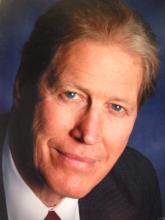
Hal S. Chase was born in Des Moines during WW2, but grew up in legally segregated Frankfort, KY from eight to eighteen. He taught U.S., African American, and Iowa history at Des Moines Area Community College from 1989 to 2009, and coordinated and contributed a chapter to Outside In: African-American History in Iowa, 1838-2000. He then earned degrees from Washington & Lee University (BA), Stanford University (MA), and University of Pennsylvania (PhD) in American Civilization with an emphasis on African American History.
Outside In: African American History in Iowa
The program is a 15 minute audio-visual survey of the major people, organizations and events in Iowa’s African American history from its territorial beginning in 1838 to the present. It also emphasizes the African American
history of the place where the presentation is made, and Dr. Chase works with local people prior to the presentation to uncover and incorporate this material into the program. In addition, audience members are encouraged
to bring their stories, scrapbooks and family albums to the presentation and share their content.
Beth Hoffman
Lovilia
Email:
bethaudio@gmail.com
Website:
https://www.farmbetiowa.com

Beth Hoffman was living the good life: she had a career as a journalist and professor, and a comfortable home in San Francisco. Yet in her late 40s, she and her husband decided to leave the big city and move to his family farm
in Iowa—all for the dream of becoming a farmer, to put into practice everything she had learned over decades of reporting on food and agriculture. There was just one problem: money.
The economics of agriculture are shocking: half of America’s two million farms made less than $300 in 2019. Between rising land costs, ever-more expensive equipment, and the growing uncertainty of the climate, farming today
is a risky business. For many, simply staying afloat is a constant struggle. Even for those with a decent nest egg and access to land, like Beth and John had, making ends meet at times seems impossible. Bet the Farm
is a first-hand account of the perils of farming today and a personal exploration of more just and sustainable ways of producing food.
Hoffman can present about her book, visit with book clubs, or speak to groups about relevant topics like farmland transition, the state of Iowa agriculture and how farms can be more economically viable.
Bet the Farm: The Dollars and Sense of Growing Food in America
Helen Lewis
Sioux City
Phone: (712) 274-8733, ext. 1423
Email:
helen2000hum@yahoo.com
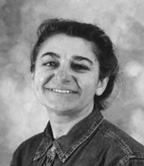
Helen Lewis, an Eastern transplant to the Midwest, teaches at Western Iowa Tech Community College in Sioux City. She has taught English and Humanities courses since 1971, and her special interests include Westerns, women artists, Medieval mysteries and square dancing. Ms. Lewis portrays Jane Addams for the Great Plains Chautauqua Society, Inc.
Voicing a Cause, Voicing a Self: Jane Addams at the Hull House
Throughout her long career advocating the needs of impoverished immigrants, exploited laborers, youth criminals and war victims, Jane Addams valued Hull House, her settlement house in Chicago, as the center from which she
and her colleagues could assist others, improve society and benefit themselves. She trusted social democracy to restore dignity to the marginal. Her many publications reveal a person finding identity and purpose through her
causes. The presentation, done in costume of the period, helps the audience to understand the path chosen by this Nobel Peace Prize recipient.
Women of Warmth, Wisdom and War: Images of Native American Women in Westerns
Although film critics and viewers frequently dismiss Native American women in Westerns as stereotypes providing background for the action, a reexamination of Westerns reveals that Native American women characters often have
more than a mere setting or sexual purpose. Despite the lack of Native American actresses in the films, the Westerns have depicted the Native American cultures with women as healers, counselors and even warriors. This presentation
considers those Westerns readily available on video in order to offer the audience a new way to view old Westerns. (Includes film clips.)
Donald G. Shurr
Phone: (319) 356-2420
Email:
dshurr94@msn.com
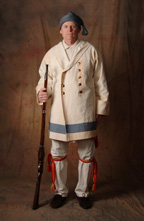
Donald G. Shurr, is a Certified Prosthetist/Orthotist and Physical Therapist who has lived in Iowa since 1964. An author of many articles and books, Don has taught at the University of Iowa in Physical Therapy for 25 years. In addition, Don was trained in St. Charles, Missouri, to pilot the reenactment boats used during the Bicentennial commemoration of the Corp of Discovery expedition.
Lewis and Clark in Iowa
“Lewis and Clark in Iowa” begins with the story before the expedition: the sale of the Louisiana Purchase to the United States. Tracing the 1803 course from Elizabeth, Pennsylvania to St. Charles, Missouri, Shurr discusses
the background of the many “players” of the expedition including York, the engages and Seaman. Moving up the Missouri River focus shifts to events occurring in Iowa such as the death of Sgt. Floyd. An accompanying PowerPoint
presentation shows the keelboat and the pirogues with actual photos taken in St. Charles and at the Onawa Lewis and Clark State Park. The audience will be exposed to the many “firsts” that occurred in Iowa, the true peril
of this journey and the return of Lewis and Clark to civilization at journey’s end.
Equipment required: computer and projector needed for power point presentation
Robert Vavra
Phone: (563) 586-2123
Email:
info@MaidenVoyageTours.com
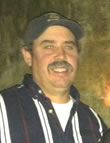
Robert Vavra is a Mississippi Riverboat Captain and the owner and operator of The Maiden Voyage, a working river boat on the Upper Mississippi River. After working for a number of years in commercial Fishing, clamming and trapping, Robert realized a young man should not hitch his wagon to a dying industry. Today, commercial fishing, clamming and trapping has all but disappeared. He witnessed the death of these industries.
The Day of the Hunter-Gatherer
A hands-on, interactive experience covering the following topics: Marquette and Joliet—the role they played on the Upper Mississippi River. Early Fur Industry—trading with Native Americans and the hatting industry. Clamming
Industry—Mother of Pearl buttons. Pearling Days—world’s finest freshwater pearls. The Cultured Pearl Industry—Mother of Pearl clam shell beads. Fishing as a way of life—the rough fish industry. The Old World way of clamming
and fishing. New technologies—new ways to fish, new ways to use the fish. Health and Status of the Great Mississippi River—invasive species.
Danuta Hutchins
Storm Lake
Phone: (712) 732-6779
Email:
hutchinsd@bvu.edu
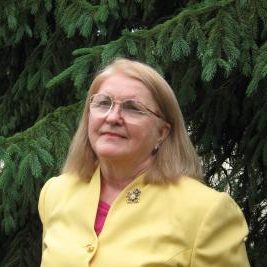
Danuta Zamojska Hutchins, of Storm Lake, was born in Warsaw, Poland and experienced the ravages of Nazi occupation, their reprisals for the Warsaw Uprising of 1944 and Poland’s fall to communism after its liberation by the
Soviet Army. Dr. Hutchins left Poland in 1962 to study American literature and language at the University of Minnesota. She received her Ph.D. in Modern Languages, Education and Linguistics from the University of Minnesota,
Minneapolis. Dr. Hutchins has taught Slavic Languages, Literatures and Cultures at Buena Vista College (now University) at Storm Lake, Iowa; Indiana University at Bloomington, Indiana; Iowa State University at Ames, Iowa
and Ohio State University at Columbus, Ohio. She has also taught courses in German Language, Literature and History and Russian Language and Literature at Teikyo-Westmar University and Westmar University at Le Mars, Iowa
from which she retired at its closure in 1995. She has authored many papers and book chapters in her field and has written four books of general interest. Her early retirement enabled her to devote her time to her artwork,
resulting in several successful group and solo exhibits of paintings, etchings and sculpture.
Dr. Hutchins and her husband, a professor of Chemistry at Buena Vista University in Storm Lake, have two grown children, Edward and Maria.
The Butterfly Effect: Why Do We Feel Empathy with the Victims of War, Hunger, Terror and Natural Disasters?
Referring to her book, “Torn Out Memories,” Dr. Hutchins tells the experiences of a child living under the Nazi occupation of Poland and during the Warsaw Uprising. She relates her personal trauma to the terrors suffered
by the victims of 9/11 attacks.
Herbert Hoover’s Role in Distributing Food in Post WWI and WWII in Europe
As a child, Dr. Hutchins experienced firsthand President Hoover’s distribution of food in Poland after WWII. A chapter in her book, “Torn Out Memories,” gives details of those experiences and her connection with the Hoover
birthplace in West Branch.
Sacred and Profane Art Presented in Power Point
Are the issues and images of the human body in European art of the Middle Ages through the present. Images selected include examples of figurative paintings, drawings and caricature, as well as sculpture. Discussion centers
on both the aesthetic and the philosophic considerations of the human image as a vehicle of veneration and beauty versus that of scorn and distortion.
Flowers of the Prairie
With a copy of the “Prairie and Woodland Flowers Coloring Book” as reference, this presentation identifies prairie wildflowers, their common English names and Linnaeus-based classification in Latin. It informs when they
blossom, where they grow and what medicinal and food uses have they served during the times of early pioneers and Native American Peoples. With the “hands-on” component of drawing/coloring images of those flowers, this presentation
can be taken to the local prairies or prairie gardens and tailored to specific ages and interests upon request.
Understanding and Reading Slavic Poetry in English Translation
This presentation includes recitation and discussion of poems and short poetic works written by the most outstanding contemporary Slavic authors, centered especially on women poets. Discovering some intimate details in their
biographies and significant events surrounding them and their epoch enhance the understanding of selected works and bring these poets to life. Some humorous commentaries on the idiomatic and cultural differences between the
works’ original language and that of the English translation provide a glimpse into the task of literary transposition from a very personal vantage point by Danuta Hutchins, herself a poet and published translator of many
poetic works into and from the English language.
Randy Lengeling
Dubuque
Phone: 563-557-9111
Email:
rlcl1165@aol.com

Randy Lengeling is a native Iowan who grew up in Carroll and received his entire medical education in internal medicine and gastroenterology at the University of Iowa in Iowa City. In 1981, he started and continues his private practice in Dubuque with the Grand River Medical Group (formerly Dubuque Internal Medicine). Having been goal-directed in his medical training, he had little, if any, art history instruction and when then having the time and resources to travel, he attempted to satisfy this “incomplete education” by visiting art museums at every opportunity. While initially becoming a fan of Impressionism, upon one of many visits to the Art Institute of Chicago in 1984, he viewed a major retrospective of a fellow lifelong Iowan entitled “Grant Wood: The Regionalist Vision.” Naively, he knew of and had seen Wood’s American Gothic there, but the inspiring story of this Iowan’s arduous journey from a poor farm boy to the creator of the overnight success that now rivals DaVinci’s Mona Lisa for international recognition, was an epiphany. From then on, his avocation has been collecting, researching, curating and lecturing on Iowa’s most famous artist and is a founding and active trustee and benefactor of the Dubuque Museum of Art, which has a world-class Grant Wood collection.
Grant Wood: Artistic Rags to Riches—An American Success Story
This is an animated PowerPoint presentation, with archival photographs and video segments, that looks at Wood’s personal life story, his artistic development and meteoric rise to international prominence as the leader of
Regionalism, his controversial professorship at the State University of Iowa and his enduring legacy in art history, having lived nearly his whole life in Iowa. His story is an inspiration for all Americans, particularly
Iowans, and a shining example that world-influencing achievements can occur in this “flyover” state that we call home. Original Grant Wood works may be available for viewing.
David Connon
Earlham
Phone: (515) 758-2115
Email:
connon3@q.com
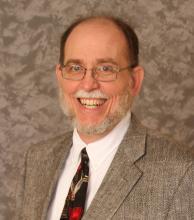
David Connon is an independent researcher and writer. He stumbled on to Confederates from Iowa while researching the Iowa Underground Railroad. He spent a decade at Living History Farms. Presently, he interviews novelists for the Historical Novel Society, and an occasional historian. A great-great-grandson of two Union veterans, his blog is Confederates from Iowa: Not to defend, but to understand.
Researching Your Civil War Ancestor
Experienced researcher David Connon shares strategies for tracking down your Civil War ancestor, North or South. Time permitting, audience members could share their research, and he could suggest options. Connon is descended
from two Union veterans. He documented 76 Iowa residents who served the Confederacy. He tells their pre-war, war-time, and post-war activities in Iowa Confederates in the Civil War.
The Propaganda Campaign in Iowa during the Civil War
While troops fought in the South, Republicans waged a propaganda campaign in Iowa. They expertly demonized Democrats. Republicans were so successful that they controlled the state government for decades after Appomattox.
David Connon will share this story, focusing on one Iowa Democrat whose name became a byword for traitor.
Iowans who fought against the Union
Most Iowans think that the state was solidly pro-Union during the Civil War. After all, some 76,500 residents fought for the North. In reality, Iowa Democrats formed a spectrum of dissent. The majority of Democrats opposed
abolishing slavery (and yet favored the Union war effort); the minority sympathized with the South. Out of this group, at least 60 Iowa residents served the Confederacy. This talk will focus on four or five of them. David
Connon will explore their motivations and describe their pre-war, war-time, and post-war experiences. After each soldier’s story, he will invite audience members to share their observations.
Josiah Bushnell Grinnell and the Iowa Underground Railroad
“Preacher,” “congressman,” “negro-stealer”: Josiah Bushnell Grinnell was called all of those things during his life. He was called a negro-stealer because he participated in the Iowa Underground Railroad. J.B. Grinnell and
other Grinnell residents helped at least 37 fugitive slaves who passed through their town before the Civil War. But some residents opposed this work. David Connon will tell a story of racism, noble actions and conflict. He
will highlight abolitionist John Brown’s visit to Grinnell, and Grinnell’s first riot over the presence of fugitive slaves in the public school.
O.J. Fargo
Creston
Phone: (641) 782-8625
Email:
ojfargo@iowatelecom.net or
ojfargo@windstream.net
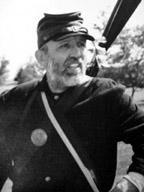
O.J. Fargo is a retired Director of Media Services and Social Studies consultant. He is the author of two books on Iowa history on the everyday life of a Civil War soldier and Iowa in the Civil War, as well as 27 booklets on Iowa and Western US history. In addition to researching, writing, lecturing and public appearances, he is also president of an Iowa regiment of Civil War re-enactors.
Just Before the Battle Mother—A Visit from a Civil War Soldier
Mr. Fargo dresses in full Union Army regalia and focuses the first person presentation on an individual Iowa soldier’s Civil War experience. After a brief overview of the state’s involvement, the audience is introduced to
a returning Civil War veteran (played by O. J. Fargo). He will detail the experiences of an Iowan during the conflict. During and after the presentation, the audience is encouraged to ask questions and engage in a dialogue
with the “soldier,” who stays in character. The speaker will bring an artifact display and full electronic Civil War roster of all men who served in and from Iowa. It can be searched by name, city, county and/or birthplace.
Greyhounds and Hawkeyes—Iowa in the Civil War
The program details Iowa’s involvement in the Civil War from Ft. Sumter to the surrender at Appomattox. Although he focuses on the everyday experiences of a soldier in the field, Mr. Fargo also describes the situation on
the home front and politics of the era. Audience questions are welcome.
Pete Grady
Marshalltown
Phone: 641-691-4675
Email:
grady.peter.j@gmail.com
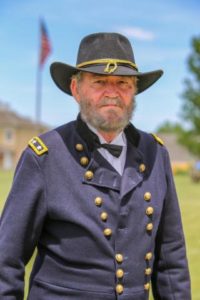
Grady lives in Marshalltown, Iowa. He is a 1975 graduate of St. Ambrose College, Davenport, and a 1984 graduate of the University of Iowa College of Law in Iowa City. He served in the Iowa Department of Justice as an Assistant Attorney General until his retirement in 2016.
Unconditional Surrender: A Visit with Ulysses S. Grant is a one-man show about the life and times of the Civil War General and 18th President of the United States. Pete Grady, the author and performer,
has performed his show over 100 times at venues in Iowa, Wisconsin, Minnesota, Illinois, Missouri, South Dakota, Colorado, and Arizona. Grady is fully vaccinated against COVID-19 and resumed performing the show June
1, 2021. The show has been performed at libraries, museums, and community theaters, at outdoor venues, and at gatherings as diverse as a meeting of alumni of the United States Military Academy and as part of the Fort
Sisseton, South Dakota Historical Festival. The show has also been presented as dinner theatre.
The program has been described as “a riveting performance that captures the essence of Ulysses S. Grant. Well scripted and perfectly delivered” (Greg Wolk, Missouri’s Civil War Heritage Foundation, St. Louis,
Missouri) and as “. . . the most engaging program we have ever hosted at the Kirkendall Public Library.. . . . . I highly recommend this program.” (Joy King, Kirkendall Public Library, Ankeny, Iowa).
About Unconditional Surrender: A Visit with Ulysses S. Grant: A performance runs 60-70 minutes, and features period music, photographs and cartoons as Grant reviews his life—an informative, humorous and touching portrayal of the victorious General whose strategy and tenacity won the Civil War, the President who struggled to rebuild his nation after the war and the husband and father whose final efforts were devoted to the financial support of his wife and family. Venues are asked to provide a table/desk and chair for the performance.
John Liepa
West Des Moines
Phone: 515-979-8539
Email:
jliepa17@aol.com
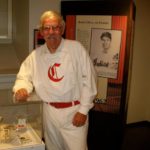
John is Professor Emeritus of History and Political Science at Des Moines Area Community College (DMACC.) He taught courses in Political Science, U.S., and Iowa History from 1972-2010. He has a B.S in History and an M.A. in Political Science from Iowa State University. He received an “Excellence in Education” award in 2001 and was honored as DMACC’s “Educator of the Year” in 2004. He served five terms on the State Historical Society of Iowa’s Board of Trustees from 1998 – 2113, having served both as Chair and Vice-Chair; and, on the Iowa Historical Foundation, the fundraising arm of the State Historical Society of Iowa. Since retiring, he has taught courses for the Senior College of Greater Des Moines, OLLI (Osher Lifelong Learning Institute) at Drake University and as an independent presenter on “Iowa’s Role in the Civil War,” Iowa’s Ethnic Heritage, or “Who Do You Think You Are?,” and the “Early History of Baseball in Iowa.” John has been a 24-year member and Program Chair of the Des Moines Civil War Roundtable.
A life-long baseball card collector, John owns an extensive collection of cards and memorabilia representing Iowa’s 225 Major Leaguers, featuring Iowa’s seven Hall-of-Famers. A charter member of Iowa’s “Field of Dreams” chapter of the Society for American Baseball Research (SABR), he has published numerous articles on Iowa baseball history and was honored by Major League Baseball asking him to write an article on early Iowa baseball history for the official 2022 “Field of Dreams ” game program. Over the past 13 years, he has done over 208 presentations on baseball history throughout Iowa, often appearing as Montrose, Iowa’s Calvin McVey, Iowa’s first professional baseball player, who played for America’s first all-professional baseball team-the 1869 Cincinnati Red Stockings. John lives in West Des Moines, Iowa with his wife, Dianne.
How Iowa Met Baseball: the Myths, the History, the Players
Over the past century the setting for the spring passion of many Iowans has been the ballpark. This presentation explores the myths of baseball’s origins, the early history and evolution of the game, baseball’s journey to
Iowa and the role of the Civil War in spreading its popularity. Audiences will learn about some of Iowa’s baseball pioneers and view an extensive collection of baseball memorabilia featuring Iowa players.
Iowa’s Role in the Civil War
This presentation tells the story of how Iowa events and changing attitudes from 1830-1861 influenced its Civil War roles; the evolution and changing status of laws affecting black Iowans; the role played by Iowans during
the war, including key individuals and battles; the home front; and finally, the immediate and long-term impact on Iowa history.
Iowa’s Ethnic Heritage, or “Who Do You Think We Are?”
Enjoy the unfolding and changing adventure of Iowa’s immigration history. Beginning with the Ioway, one of 17 distinctive indigenous tribal groups, we’ll trace chronologically who we are as Iowans. From Spanish explorers and French trappers, traders and priests; to the dominant English, Germans and Irish; to Scandinavians, Dutch and Czechs, we’ll explore why these group chose to leave their homelands and how they eventually ended up in Iowa. African-Americans, Eastern Europeans and Hispanics have different stories to share along with other “newer” Iowans. This course is personal and interactive and we’ll work together to discover who we are, and who we are becoming as Iowans.
Thomas Dean
The University of Iowa
Phone: 319-335-1995
Email:
thomas-k-dean@uiowa.edu

Thomas Dean is Senior Presidential Writer/Editor at the University of Iowa with primary responsibilities in speechwriting, and he teaches interdisciplinary courses at the university as well. He also teaches with the Iowa Summer Writing Festival and the UI First-Year Seminar Program, and he has taught community education courses through the Iowa City Senior Center and other programs. Dean received a BA in English, a BM in Music History and Literature, an MA in English from Northern Illinois University and a PhD in English from the University of Iowa. He has taught writing, literature and interdisciplinary subjects at Cardinal Stritch College (Milwaukee), Michigan State University, and Moorhead State University (Minnesota). Dean has published essays in regional and national publications. Books include The Grace of Grass and Water: Writing in Honor of Paul Gruchow (edited collection, Ice Cube Press, 2007) and Under a Midland Sky (essays, Ice Cube Press, 2008). He has served on the Board of Trustees of the Iowa City Public Library and is currently a member of the Board of Directors of Humanities Iowa.
Green Fire: Aldo Leopold and a Land Ethic for Our Time
Thomas Dean is trained as a Land Ethic Leader through the Aldo Leopold Foundation, a program with the goal to both introduce Leopold’s land ethic to a wider audience and also to deepen understanding and engagement through
dialogue about the meaning and value of conservation. This program includes a screening of the Emmy Award-winning Aldo Leopold documentary, “Green Fire,” and a discussion of the film and Leopold’s land ethic. “Green Fire”
is the first full-length documentary film ever made about legendary environmentalist Aldo Leopold, author of A Sand County Almanac, who was born and raised in Burlington, Iowa. “Green Fire” highlights Leopold’s extraordinary
career, tracing how he shaped and influenced the modern environmental movement. The film was produced in partnership with the Aldo Leopold Foundation, the Center for Humans and Nature and the US Forest Service, and it was
supported by funding from Humanities Iowa. “Green Fire” provocatively examines Leopold’s thinking, renewing his idea of a land ethic for a population facing 21st-century ecological challenges. The film describes the formation
of Leopold’s idea through his life and experiences, exploring how it changed one man and later permeated through all arenas of conservation today. Through these examples, the film and discussion challenge viewers to contemplate
their own relationship with the land community.
Debra Marquart
Iowa Poet Laureate
Iowa State University
515-290-7731
marquart@iastate.edu
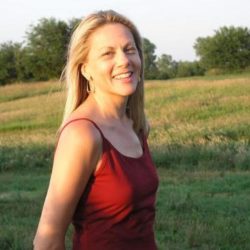
Debra Marquart is a Distinguished Professor of Liberal Arts and Sciences at Iowa State University and Iowa’s Poet Laureate. Her work explores the relationship between the spoken word, the literary arts, storytelling, and music. Marquart has published six books, including Small Buried Things: Poems, and The Horizontal World: Growing up Wild in the Middle of Nowhere, and she continues to perform with her jazz-poetry, rhythm & blues project, The Bone People, with whom she has released two CDs: Orange Parade (folk/rock) and A Regular Dervish (jazz-poetry). Her work has received over 50 grants and awards including a National Endowment for the Arts Fellowship, a PEN USA Nonfiction Award, a New York Times Editors’ Choice commendation, and Elle Magazine’s Elle Lettres Award, and has been featured on the BBC and National Public Radio. She is the senior editor of Flyway: Journal of Writing & Environment, and she teaches creative writing in ISU’s MFA Program in Creative Writing and Environment and in the Stonecoast Low-Residency MFA Program at the University of Southern Maine.
POETRY, MUSIC & THE ENVIRONMENT
Debra Marquart is available to read from her creative work (poetry, fiction, memoir) and to perform music alone, or with her band, The Bone People. A singer-songwriter, Marquart fuses poetry, music, and storytelling
in her performances. The topics in Marquart’s five books and ongoing research projects range widely to include the following: agriculture and rural life; music performance and popular music history; immigration and travel;
and environmental issues such as oil extraction and climate change.
Tom Milligan
Amana
Phone: (515) 779-9775
Email:
TMilliganActor@aol.com
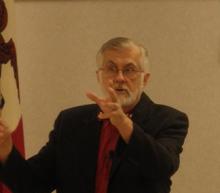
Tom Milligan has spent 45 years as a working theater artist in Iowa. As an actor, director, scenic designer as well as producer, his work has been seen throughout Iowa and the Midwest. Beginning in 1973, many remember his work at Iowa’s first dinner theater, Charlie’s Showplace, in Des Moines. Over the years he has been on staff at The Des Moines Playhouse, The Ingersoll Dinner Theater, The Drake Opera, Hoyt Sherman Theater, The Drama Workshop and many other venues in the Des Moines area. In 2005 he moved to The Amana Colonies, working on multiple productions at The Old Creamery Theater, The Iowa Theater Artists Company, as well as many self-produced productions. His 16-year association with Humanities Iowa reflects his passion for both theater and history through his unique one man play presentations.
Cartoons & Conservation: A Visit with Ding Darling
In this 45-minute presentation, Jay N. “Ding” Darling visits with the audience, as an old friend, in his 11th office at The Des Moines Register. Beginning with his early years in Sioux City where as a young boy where
he became aware of the natural world around him while developing skills as an editorial cartoonist, he recalls his remarkable life journey. His story continues to include two Pulitzer Prize-winning editorial cartoons for
the Register and a remarkable career as a nationally known conservationist. From the introduction of The Duck Stamp to the creation of the National Wildlife Federation, Darling’s influence was felt not only through
his cartoons but his actions as well. Considered by many to be one of the most important members of the modern conservation movement in the first half of the 20th century, the impact of his work is still felt today.
Grant Wood: Prairie Rebel
In this 45-minute, one-man show, Grant Wood chats with the audience as if talking to an old friend across the backyard fence, or maybe at his home at Five Turner Alley in Cedar Rapids. He tells us about his life and how he
changed the art world forever with his work. It is the man behind American Gothic that we hear and see, and the story of how he took the moments, the memories and the people of our state to show the whole world the specialness
of this Iowa. After the presentation, the audience is encouraged to ask questions about Grant Wood and his life.
American Dreamer: The Life and Times of Henry A. Wallace
In this one-act play based on the award-winning book of the same name by Senator John C. Culver and John Hyde, actor Tom Milligan portrays Henry A. Wallace, the agricultural innovator and founder of Pioneer Hi-Bred seed corn
company who became US Secretary of Agriculture and later Vice President under Franklin Roosevelt. Admired by many and later branded as a Socialist during his controversial 1948 campaign for the presidency, Wallace always
held out a vision for the future.
Larry Stone
Elkader
Phone: (563) 245-1517
Email:
lstone@alpinecom.net
Website:
www.larrystonesiowa.com
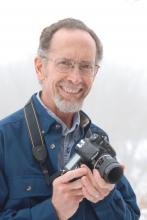
Larry Stone’s boyhood fascination with the creeks and woodlots on his family’s southern Iowa farm brings authenticity to his nature photography, writing and lectures. With degrees in biology and journalism, he also understands the natural world and can communicate the wonders of outdoor experiences. During a 25-year career with the Des Moines Register, from 1972-1997, Larry traveled throughout Iowa, sharing stories and photos of the state’s natural treasures.
His work also has appeared in The Iowan, Iowa Natural Heritage, Pheasants Forever, Our Iowa and other magazines. Larry has received awards from the Iowa Wildlife Federation, the Iowa Chapter of the Sierra Club, the Iowa Sportsmen’s Federation, the Iowa Division of the Izaak Walton League of America, the Association of Earth Science Editors, the International Regional Magazine Association and the Outdoor Writers Association of America. He is a member of the Clayton County Conservation Board. Larry and his wife, Margaret, live near Elkader, where they manage woodlands, native prairie and reconstructed prairie on a farm along the Turkey River. Larry also operates a small business specializing in natural history books.
Gladys Black: The Legacy of Iowa’s Bird Lady
The late Gladys Black of Pleasantville was widely known throughout Iowa as a conservationist, educator and amateur expert on birds. Larry and co-author Jon Stravers have written a book about Gladys. Larry’s slide program
acknowledges this colorful woman’s impact on so many Iowans.
Whitetail: Treasure, Trophy or Trouble?
Although Iowa’s original deer herd vanished in the face of white settlement, the animals rebounded during the 20th century to the point of overpopulation. Adapted from a 2003 book written for the Iowa Department of Natural
Resources, “Whitetail” traces that history. It’s a story with broad appeal to farmers, hunters, motorists and wildlife watchers—anyone whose life has been affected by Iowa deer.
Iowa: Portrait of the Land
Based on Larry’s award-winning Earth Year 2000 book for the Iowa Department of Natural Resources, “Portrait” is a reminder to Iowans of the rich history of their natural resources, with an appeal for protecting
that heritage.
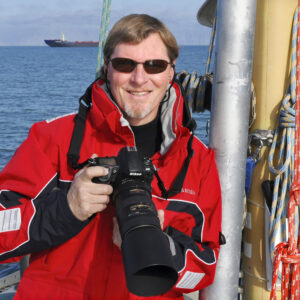
David Thoreson is one of America’s preeminent explorers of our time and will take you on an extraordinary adventure. Over The Horizon is his compelling story and visual memoir. The sailor from Lake Okoboji, Iowa, was an experienced adventure traveler when he began sailing the high seas with a “salty” hog farmer from southern Minnesota. Together they began exploring the far reaches of the globe. On their second attempt at crossing the Arctic’s Northwest Passage, Thoreson realized they were witnessing a rapidly changing Arctic and ocean environment.
With his many extreme expeditions and Midwestern roots, photographer, sailor, and explorer David Thoreson has a unique life story. His path has been anything but traditional. Thoreson grew up in Algona, Iowa, learned to sail and love the water as a boy on the Iowa Great Lakes. He shares how these experiences led to a life of exploration and discovery at the far reaches of the globe. David’s book and presentation combine stunning visuals and storytelling about sailing in the ice, lives of native hunters, scientists in the Arctic and teamwork in the face of grave danger.
David Thoreson is an Explorers Club National Fellow and the first American explorer in history to sail the Northwest Passage in both directions. Thoreson has sailed more than 75,000 nautical miles, including be¬low the Antarctic Circle, three times across the Atlantic, seven times over the Arctic Circle, twice around Cape Horn and, in 2009-10, a 28,000-mile circumnavigation of North and South America. His documentary of that voyage was nominated for an Emmy and published in the beautiful photo book, One Island, One Ocean. David assisted the 2022-23 National Geographic expedition to the Northwest Passage aboard the sailboat Polar Sun for the August 2023 cover story.
Now a sought-after speaker on polar, ocean and conservation issues, Thoreson has shared his observations at the National Press Club, World Science Festival, TEDx, Nobel Peace Prize Forums, Explorers Club, universities, and institutions across the world.
Personal Adventures and Explorations of the Northwest Passage
The presentation includes stories of David’s three Arctic expeditions aboard small sailboats and the quest for the infamous Northwest Passage. He begins with the 1994 passage attempt aboard the 57′ s/v Cloud Nine in which
the crew became trapped in the ice and barely escaped. Thirteen years later, in 2007, David and crew were successful in traveling along famed explorer Roald Amundsen’s route and became the first American sailboat in history
to accomplish this feat. In 2009, he was ice expert and documentary photographer on the scientifically-equipped, 64′ s/v Ocean Watch which accomplished the Northwest Passage from west to east. David became the only American
sailor in history to transit the infamous passage in both directions.
David tells adventure stories visually, stitching voyages together and including brief histories, photography and landscape, trip planning, ice charts, wildlife, native villages and changes in the environment contributing
to loss of Arctic ice.
Sailing Around the Americas, a 28,000-Mile Small Boat Journey
In 2009-10, David was selected to be the documentary photographer and filmmaker on a 13-month, 28,000-mile sailing circumnavigation of the North and South American continents. The educational and scientific voyage was designed
to raise awareness in the public and highlight many important ocean and sea issues. David took over 75,000 images during the sailing adventure and this is a stunning visual presentation.
The Northwest Passage in the Era of Climate Change
This presentation includes a more in-depth look at the science of climate change with the emphasis on the Arctic. Using David’s unique northern experiences, he explores the state of the polar ice cap, changes in native villages,
culture, tourism, resource development and the northern sea routes with increasing shipping and commerce in the Arctic. Why is the Arctic considered the epicenter of the climate debate? What is the future of the Northwest
and Northeast Sea Passages? David will explore the many questions and host a lively discussion.
Equipment required: Screen, microphone (larger venues)
Over The Horizon: A Life of Ocean and Polar Exploration
Join the crew and explore with Thoreson sailing to Antarctica and the Arctic Ocean’s Northwest Passage aboard the sailboats Cloud Nine and research vessel Ocean Watch. David will share stories of his many polar adventures over the past thirty years including his historic 28,000-mile circumnavigation of the N/S American Continents, working with NASA, NOAA and world-renowned scientists. David will introduce you to a life of exploration and many of the characters he has encountered at the ends of the earth through riveting stories and stunning photography.
Needs: Projector/Screen or Smart TV, handheld or lapel mic, podium, or table for laptop
Abby Dubisar
Iowa State University
https://engl.iastate.edu/directory/abby-dubisar/
Email:
dubisar@iastate.edu
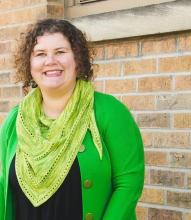
Dr. Abby M. Dubisar is an Associate Professor at Iowa State University in Ames. She earned her PhD at Miami University of Ohio, where she wrote a dissertation about women peace activists’ rhetorical strategies. She earned her MA at Ohio State University and her BA at the University of Missouri—Kansas City. She has presented her research at national and international conferences and teaches courses in popular culture analysis, gender and communication, writing and rhetoric.
Farm Women as Global Citizens: Post-WWII Authority of the “First Lady of the Farm”
This presentation draws upon the lifework of Ruth Buxton Sayre, known during her lifetime as “First Lady of the Farm.” An Iowa native, Sayre was appointed to President Eisenhower’s agricultural policy committee and served
as the president of the Associated Country Women of the World (ACWW), among many civic roles. This presentation illustrates how Sayre had to redefine the accepted characterization of women on farms not only to fulfill her
own pursuits as a writer and speaker, but also to convince farm women that they were not exempt from the responsibility of postwar reconstruction. Sayre’s papers are housed at the State Historical Society of Iowa, in Iowa
City. This project features materials included in the archive.
Promoting Peace, Subverting Domesticity: Cookbooks Against War, 1970-2010
This historical project analyzes peace activist cookbooks, revealing how such texts ignite activism, enable community identity for subcultures and adeptly subvert women’s domestic roles. The discussion this research features
further extends our understandings of cookbooks and other “feminine” genres to connect with 21st-century trends in “new domesticity” and radical home economics that position the kitchen as the place where gender and politics
ferment.
Debra DeLaet
Drake University
Phone: (515) 271-1844
Email:
debra.delaet@drake.edu
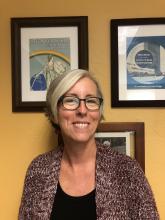
Debra L. DeLaet is Professor of Political Science at Drake University in Des Moines, Iowa. She serves as the David E. Maxwell Distinguished Professor of International Affairs. Her major research interests are in the area of human rights, global health and gender issues in world politics. She has published three books: U.S. Immigration Policy in an Age of Rights (Praeger 2000), The Global Struggle for Human Rights (Wadsworth, 2006) and (co-authored with David E. DeLaet) Global Health in the 21st Century: the Globalization of Disease and Wellness (Paradigm Publishers, 2012). In addition to these books, she has published numerous articles and book chapters in her areas of interest.
Coming to Iowa: A History of Global Migration to the United States
This talk explores a history of global migration to the United States through Iowa’s immigration history. Iowa’s history has been deeply shaped by the history of immigration to the United States. Historical patterns of migration
to Iowa reflect changes to U.S. immigration policy over time. This talk explores distinct waves of migration to Iowa (and the United States more generally) and the ways in which these waves of migration have been shaped by
U.S. immigration policy.
Human Rights in the Everyday
This talk explores how the contestation over human rights takes place in our everyday lives—in our families, our workplaces, and our civic spaces. Accordingly, potential efforts to promote human rights need to be integrated
into our everyday lives. The talk’s focus on this everyday lever for human rights promotion seeks to broaden the vision of what constitutes human rights and social justice work by exploring the capacities of actors that are
not formally part of international human rights laws and institutions. It builds on approaches to civic engagement that focus on “everyday politics” and emphasize the political capacities of actors in a wide range of settings
to generate change. The talk will build on a vision of citizenship that calls upon individual citizens to do far more than vote in any effort to produce meaningful civic change. It will investigate the potential for
non-state actors and everyday citizens to engage in transformative practices intended to advance human rights outside of the context of formal law and governance.
Justice, War Crimes and Human Rights Abuses
War-torn societies face several difficult questions as they seek to pursue justice in the aftermath of violent conflict. To what extent shall individuals guilty of war crimes and human rights abuses be punished? How should
new leaders balance potential tradeoffs between the goals of justice and peace? How can renewed cycles of violence best be prevented? This presentation will explore these questions while providing an overview of the wide
variety of mechanism that have been used in an effort to pursue justice in war-torn societies, including trials, truth commissions, reparations and official apologies.
Hal Chase
Des Moines Area Community College
Phone: (515) 208-7249
Email:
halchasebeyondrace@gmail.com

Hal S. Chase was born in Des Moines during WW2, but grew up in legally segregated Frankfort, KY from eight to eighteen. He taught U.S., African American, and Iowa history at Des Moines Area Community College from 1989 to 2009, and coordinated and contributed a chapter to Outside In: African-American History in Iowa, 1838-2000. He then earned degrees from Washington & Lee University (BA), Stanford University (MA), and University of Pennsylvania (PhD) in American Civilization with an emphasis on African American History.
Outside In: African American History in Iowa
The program is a 15 minute audio-visual survey of the major people, organizations and events in Iowa’s African American history from its territorial beginning in 1838 to the present. It also emphasizes the African American
history of the place where the presentation is made, and Dr. Chase works with local people prior to the presentation to uncover and incorporate this material into the program. In addition, audience members are encouraged
to bring their stories, scrapbooks and family albums to the presentation and share their content.
Additional Resources: Outside In: African-American History in Iowa, 1838-2000 (Available for $10 + postage by calling 515-208-7249. All proceeds go to the acquisition, preservation and promotion of African American
History in Iowa.)
David Connon
Earlham
Phone: (515) 865-8574
Email:
davidconnon523@gmail.com

David Connon is an independent researcher and writer. He stumbled on to Confederates from Iowa while researching the Iowa Underground Railroad. During the season, he works as a historical interpreter at Living History Farms. A great-great-grandson of two Union veterans, his blog is Confederates from Iowa: Not to defend, but to understand.
Researching Your Civil War Ancestor
Experienced researcher David Connon shares strategies for tracking down your Civil War ancestor, North or South. Time permitting, audience members could share their research, and he could suggest options. Connon is descended
from two Union veterans. He documented 76 Iowa residents who served the Confederacy. He tells their pre-war, war-time, and post-war activities in Iowa Confederates in the Civil War.
The Propaganda Campaign in Iowa during the Civil War
While troops fought in the South, Republicans waged a propaganda campaign in Iowa. They expertly demonized Democrats. Republicans were so successful that they controlled the state government for decades after Appomattox.
David Connon will share this story, focusing on one Iowa Democrat whose name became a byword for traitor.
Iowans who fought against the Union
Most Iowans think that the state was solidly pro-Union during the Civil War. After all, some 76,500 residents fought for the North. In reality, Iowa Democrats formed a spectrum of dissent. The majority of Democrats opposed
abolishing slavery (and yet favored the Union war effort); the minority sympathized with the South. Out of this group, at least 60 Iowa residents served the Confederacy. This talk will focus on four or five of them. David
Connon will explore their motivations and describe their pre-war, war-time, and post-war experiences. After each soldier’s story, he will invite audience members to share their observations.
Josiah Bushnell Grinnell and the Iowa Underground Railroad
“Preacher,” “congressman,” “negro-stealer”: Josiah Bushnell Grinnell was called all of those things during his life. He was called a negro-stealer because he participated in the Iowa Underground Railroad. J.B. Grinnell and
other Grinnell residents helped at least 37 fugitive slaves who passed through their town before the Civil War. But some residents opposed this work. David Connon will tell a story of racism, noble actions and conflict. He
will highlight abolitionist John Brown’s visit to Grinnell, and Grinnell’s first riot over the presence of fugitive slaves in the public school.
Abby Dubisar
Iowa State University
Website:
https://engl.iastate.edu/directory/abby-dubisar/
email:
dubisar@iastate.edu

Dr. Abby M. Dubisar is an Associate Professor at Iowa State University in Ames. She earned her PhD at Miami University of Ohio, where she wrote a dissertation about women peace activists’ rhetorical strategies. She earned her MA at Ohio State University and her BA at the University of Missouri—Kansas City. She has presented her research at national and international conferences and teaches courses in popular culture analysis, gender and communication, writing and rhetoric.
Farm Women as Global Citizens: Post-WWII Authority of the “First Lady of the Farm”
This presentation draws upon the lifework of Ruth Buxton Sayre, known during her lifetime as “First Lady of the Farm.” An Iowa native, Sayre was appointed to President Eisenhower’s agricultural policy committee and served
as the president of the Associated Country Women of the World (ACWW), among many civic roles. This presentation illustrates how Sayre had to redefine the accepted characterization of women on farms not only to fulfill her
own pursuits as a writer and speaker, but also to convince farm women that they were not exempt from the responsibility of postwar reconstruction. Sayre’s papers are housed at the State Historical Society of Iowa, in Iowa
City. This project features materials included in the archive.
Promoting Peace, Subverting Domesticity: Cookbooks Against War, 1970-2010
This historical project analyzes peace activist cookbooks, revealing how such texts ignite activism, enable community identity for subcultures and adeptly subvert women’s domestic roles. The discussion this research features
further extends our understandings of cookbooks and other “feminine” genres t
O.J. Fargo
Creston
Phone: (641) 782-8625
Email:
ojfargo@iowatelecom.net or
ojfargo@windstream.net

O.J. Fargo is a retired Director of Media Services and Social Studies consultant. He is the author of two books on Iowa history on the everyday life of a Civil War soldier and Iowa in the Civil War, as well as 27 booklets on Iowa and Western US history. In addition to researching, writing, lecturing and public appearances, he is also president of an Iowa regiment of Civil War re-enactors.
Just Before the Battle Mother—A Visit from a Civil War Soldier
Mr. Fargo dresses in full Union Army regalia and focuses the first person presentation on an individual Iowa soldier’s Civil War experience. After a brief overview of the state’s involvement, the audience is introduced to
a returning Civil War veteran (played by O. J. Fargo). He will detail the experiences of an Iowan during the conflict. During and after the presentation, the audience is encouraged to ask questions and engage in a dialogue
with the “soldier,” who stays in character. The speaker will bring an artifact display and full electronic Civil War roster of all men who served in and from Iowa. It can be searched by name, city, county and/or birthplace.
Greyhounds and Hawkeyes—Iowa in the Civil War
The program details Iowa’s involvement in the Civil War from Ft. Sumter to the surrender at Appomattox. Although he focuses on the everyday experiences of a soldier in the field, Mr. Fargo also describes the situation on
the home front and politics of the era. Audience questions are welcome.
Liz Garst
Coon Rapids
Phone: (712)-684-5240
Email:
lizgarst.LG@gmail.com
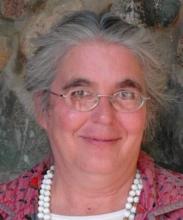
Liz Garst is the granddaughter of the famous Iowa farmers and citizen diplomats Roswell and Elizabeth Garst, and, like her forefathers, she likes to tell a good story. She manages banking and farming interests for the Garst family, and has a BA in English Literature, a MS in Agricultural Economics and a MBA. She is a board member and volunteer for Whiterock Conservancy, a non-profit land trust near Coon Rapids, which is dedicated to finding balance between agriculture, the environment and people. Whiterock Conservancy stewards the Roswell and Elizabeth Garst Farmstead, which is listed as nationally significant on the National Register of Historic Places.
Corn and Khrushchev
The Garst Family has deep roots in the history of Iowa. Based on her family experience in Coon Rapids, Liz recounts the history of agricultural development in Iowa, from early settlement through the fabulous mid-century explosion
of farm productivity, based on the hybrid seeds, machinery, fertilizers and livestock technologies promoted by her grandfather. Liz tells how it came to pass that Soviet Premier Nikita Khrushchev and his family visited
the Garst family in 1959, and recalls fun stories from her personal memories as an 8-year-old participant. Embedded in the entertaining story are history and economics lessons and a powerful message about the ability
of an individual to make a difference.
Beth Hoffman
Lovilia
Email:
bethaudio@gmail.com
Website:
https://www.farmbetiowa.com

Beth Hoffman was living the good life: she had a career as a journalist and professor, and a comfortable home in San Francisco. Yet in her late 40s, she and her husband decided to leave the big city and move to his family farm
in Iowa—all for the dream of becoming a farmer, to put into practice everything she had learned over decades of reporting on food and agriculture. There was just one problem: money.
The economics of agriculture are shocking: half of America’s two million farms made less than $300 in 2019. Between rising land costs, ever-more expensive equipment, and the growing uncertainty of the climate, farming today
is a risky business. For many, simply staying afloat is a constant struggle. Even for those with a decent nest egg and access to land, like Beth and John had, making ends meet at times seems impossible. Bet the Farm is a
first-hand account of the perils of farming today and a personal exploration of more just and sustainable ways of producing food.
Hoffman can present about her book, visit with book clubs, or speak to groups about relevant topics like farmland transition, the state of Iowa agriculture and how farms can be more economically viable.
Bet the Farm: The Dollars and Sense of Growing Food in America
Randy Lengeling
Dubuque
Phone: 563-557-9111
Email:
rlcl1165@aol.com

Randy Lengeling is a native Iowan who grew up in Carroll and received his entire medical education in internal medicine and gastroenterology at the University of Iowa in Iowa City. In 1981, he started and continues his private practice in Dubuque with the Grand River Medical Group (formerly Dubuque Internal Medicine). Having been goal-directed in his medical training, he had little, if any, art history instruction and when then having the time and resources to travel, he attempted to satisfy this “incomplete education” by visiting art museums at every opportunity. While initially becoming a fan of Impressionism, upon one of many visits to the Art Institute of Chicago in 1984, he viewed a major retrospective of a fellow lifelong Iowan entitled “Grant Wood: The Regionalist Vision.” Naively, he knew of and had seen Wood’s American Gothic there, but the inspiring story of this Iowan’s arduous journey from a poor farm boy to the creator of the overnight success that now rivals DaVinci’s Mona Lisa for international recognition, was an epiphany. From then on, his avocation has been collecting, researching, curating and lecturing on Iowa’s most famous artist and is a founding and active trustee and benefactor of the Dubuque Museum of Art, which has a world-class Grant Wood collection.
Grant Wood: Artistic Rags to Riches—An American Success Story
This is an animated PowerPoint presentation, with archival photographs and video segments, that looks at Wood’s personal life story, his artistic development and meteoric rise to international prominence as the leader of
Regionalism, his controversial professorship at the State University of Iowa and his enduring legacy in art history, having lived nearly his whole life in Iowa. His story is an inspiration for all Americans, particularly
Iowans, and a shining example that world-influencing achievements can occur in this “flyover” state that we call home. Original Grant Wood works may be available for viewing.
John Liepa
West Des Moines
Phone: 515-979-8539
Email:
jliepa17@aol.com

John is Professor Emeritus of History and Political Science at Des Moines Area Community College (DMACC.) He taught courses in Political Science, U.S., and Iowa History from 1972-2010. He has a B.S in History and an M.A. in Political Science from Iowa State University. He received an “Excellence in Education” award in 2001 and was honored as DMACC’s “Educator of the Year” in 2004. He served five terms on the State Historical Society of Iowa’s Board of Trustees from 1998 – 2113, having served both as Chair and Vice-Chair; and, on the Iowa Historical Foundation, the fundraising arm of the State Historical Society of Iowa. Since retiring, he has taught courses for the Senior College of Greater Des Moines, OLLI (Osher Lifelong Learning Institute) at Drake University and as an independent presenter on “Iowa’s Role in the Civil War,” Iowa’s Ethnic Heritage, or “Who Do You Think You Are?,” and the “Early History of Baseball in Iowa.” John has been a 24-year member and Program Chair of the Des Moines Civil War Roundtable.
A life-long baseball card collector, John owns an extensive collection of cards and memorabilia representing Iowa’s 225 Major Leaguers, featuring Iowa’s seven Hall-of-Famers. A charter member of Iowa’s “Field of Dreams” chapter of the Society for American Baseball Research (SABR), he has published numerous articles on Iowa baseball history and was honored by Major League Baseball asking him to write an article on early Iowa baseball history for the official 2022 “Field of Dreams ” game program. Over the past 13 years, he has done over 208 presentations on baseball history throughout Iowa, often appearing as Montrose, Iowa’s Calvin McVey, Iowa’s first professional baseball player, who played for America’s first all-professional baseball team-the 1869 Cincinnati Red Stockings. John lives in West Des Moines, Iowa with his wife, Dianne.
How Iowa Met Baseball: the Myths, the History, the Players
Over the past century the setting for the spring passion of many Iowans has been the ballpark. This presentation explores the myths of baseball’s origins, the early history and evolution of the game, baseball’s journey to
Iowa and the role of the Civil War in spreading its popularity. Audiences will learn about some of Iowa’s baseball pioneers and view an extensive collection of baseball memorabilia featuring Iowa players.
Iowa’s Role in the Civil War
This presentation tells the story of how Iowa events and changing attitudes from 1830-1861 influenced its Civil War roles; the evolution and changing status of laws affecting black Iowans; the role played by Iowans during
the war, including key individuals and battles; the home front; and finally, the immediate and long-term impact on Iowa history.
Iowa’s Ethnic Heritage, or “Who Do You Think We Are?”
Enjoy the unfolding and changing adventure of Iowa’s immigration history. Beginning with the Ioway, one of 17 distinctive indigenous tribal groups, we’ll trace chronologically who we are as Iowans. From Spanish explorers and French trappers, traders and priests; to the dominant English, Germans and Irish; to Scandinavians, Dutch and Czechs, we’ll explore why these group chose to leave their homelands and how they eventually ended up in Iowa. African-Americans, Eastern Europeans and Hispanics have different stories to share along with other “newer” Iowans. This course is personal and interactive and we’ll work together to discover who we are, and who we are becoming as Iowans.
Darcy Maulsby
Lake City

Phone: 515-971-4415
Email: yettergirl@yahoo.com
Savor Iowa’s Culinary History
Savor Iowa’s amazing food heritage! Iowa’s delectable cuisine is quintessentially Midwestern, grounded in its rich farming heritage and spiced with diverse ethnic influences. From the chili-and-cinnamon-rolls phenomenon to
Maid-Rites to the moveable feast known as RAGBRAI, discover the remarkable stories behind Iowa classics and savor a smorgasbord of other unique Iowa food traditions with this fun, interactive program. Relish the tantalizing
tidbits you missed in history class! This program is based on Darcy’s top-selling book “A Culinary History of Iowa: Sweet Corn, Pork Tenderloins, Maid-Rites and More” from The History Press.
Adventures Along the Historic Lincoln Highway in Iowa
Nothing says freedom like the great American road trip, especially when you cruise the historic Lincoln Highway in Iowa. Better known today as Highway 30, the Lincoln Highway revolutionized Iowa and America when the historic
route was developed more than a century ago. If you’ve ever traveled on an interstate-or any paved road, for that matter-you owe a debt of gratitude to the visionaries who promoted the Lincoln Highway to connect the country.
The incredible story of the development of the Lincoln Highway and its legacy today reflects a tremendous story of American innovation, community spirit, freedom and an amazing slice of Iowa history that will make you want
to hit the road for your next Iowa adventure!
Iowa’s Lost History from the Titanic
What do an orphan train rider, a kidnapper, a missionary, a wealthy businessman, a wedding guest, a betrayed wife, a farmer and an immigrant recruiter have in common? All had ties to Iowa, and all were passengers aboard the
ill-fated Titanic on the fateful night of April 15, 1912, when the famous ocean liner sank. There were a surprising number of first-, second- and third-class passengers with Iowa connections, although many of their haunting,
poignant and sometimes shocking tales have nearly faded away. During this spellbinding voyage, delve into the human drama intertwined with the Titanic epic, find out who survived and explore the aftershocks that continue
to fascinate us more than a century after the Titanic sank.
Farm-to-Fork Adventures in Iowa Agriculture
If you eat, you have a connection to farming every day. Iowa has long been an epicenter of agricultural productivity and innovation. Darcy Dougherty Maulsby, who is part of a 5th generation family farm near Lake City, brings
these stories to life through this dynamic program. To truly understand Iowa, you have to understand the culture of agriculture-the stories of the people of the land. In some ways, Iowa’s ag history is the greatest story
never told. It’s more important than ever to rediscover this rich legacy, which influences so many aspects of daily life. Farming remains vital to Iowa’s economy and plays a critical role in key issues ranging from food security
to conservation to water quality. Agriculture has shaped Iowa’s landscape and the rhythms of life, from the location of towns to the evolution of the world-famous Iowa State Fair to Iowa’s beloved culinary traditions like
breaded pork tenderloins, sweet corn and more. Take a look inside this fascinating, dynamic world of crops, livestock and food-production technology. Join this remarkable journey of discovery that explores what it means to
be an Iowan, the many ways rural and urban interests are intertwined, and what it’s like to be connected to a place and to feel a certain responsibility for the land and the people who live here.
Kurt Meyer
St. Ansgar
meyer6601@aol.com

Kurt Meyer’s ancestors preceded Hamlin Garland’s family in moving to and living in Mitchell County, Iowa, where Meyer now lives. Meyer has studied Garland’s life and work extensively, emphasizing the importance of Garland’s Iowa years, 1868–‘81, between the ages of 8 and 21. Meyer has published two books of essays on Garland, conceived and wrote the forward to “Prairie Visions,” (a book featuring Garland-related photographs), and presented Garland papers at four American Literature Association conferences. For eight years, Meyer has coordinated annual Garland poetry readings and he has delivered lectures on Garland in dozens of venues in seven states.
Before returning to Iowa, Meyer lived in Appleton, Wisconsin, where he first became interested in Edna Ferber, the community where the Ferber family moved after leaving Ottumwa. It led to an intense examination of Ferber’s life and times, her circle of friends (including the infamous “Algonquin Roundtable”), as well as her many diverse literary works. While their lives were dissimilar in many respects, Meyer finds familiar patterns in backgrounds and careers of these two authors—the first two Pulitzer Prize winners with links to Iowa.
Iowa’s Claim to Prize-Winning Authors
Among the distinguished authors with an Iowa connection are Pulitzer Prize winners Hamlin Garland (1860–1940) and Edna Ferber (1885–1968). Both spent significant childhood years in Iowa—Garland in northeast Iowa, and Ferber
in Ottumwa. And both drew on their Iowa backgrounds throughout prolific writing careers.
Meyer’s presentation will introduce people to these two often-overlooked/forgotten authors: their lives, their major works, their pioneering careers, and their importance in the literary world, during their prime years as
well as today. Although they led very different lives, Meyer will focus on shared talents that made them successful and the personal and professional qualities they held in common.
Using Garland and Ferber as examples, Meyer will also suggest informal ways that Iowans can encourage and promote future generations of Pulitzer Prize winners.
Please note: the fee for the first ten scheduled events for this program will be waived under the Democracy and the Informed Citizen Initiative.
This program is part of the
Democracy and the Informed Citizen Initiative, administered by the Federation of State Humanities Councils. The initiative seeks to deepen the public’s knowledge and appreciation of the vital connections between democracy,
the humanities, journalism, and an informed citizenry.
We thank The Andrew W. Mellon Foundation for their generous support of this initiative and the Pulitzer Prizes for their partnership.
Tom Milligan
Amana
Phone: (515) 779-9775
Email:
TMilliganActor@aol.com
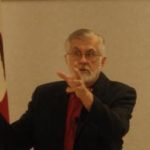
Tom Milligan has spent 45 years as a working theater artist in Iowa. As an actor, director, scenic designer as well as producer, his work has been seen throughout Iowa and the Midwest. Beginning in 1973, many remember his work at Iowa’s first dinner theater, Charlie’s Showplace, in Des Moines. Over the years he has been on staff at The Des Moines Playhouse, The Ingersoll Dinner Theater, The Drake Opera, Hoyt Sherman Theater, The Drama Workshop and many other venues in the Des Moines area. In 2005 he moved to The Amana Colonies, working on multiple productions at The Old Creamery Theater, The Iowa Theater Artists Company, as well as many self-produced productions. His 16-year association with Humanities Iowa reflects his passion for both theater and history through his unique one man play presentations.
Cartoons & Conservation: A Visit with Ding Darling
In this 45-minute presentation, Jay N. “Ding” Darling visits with the audience, as an old friend, in his 11th office at The Des Moines Register. Beginning with his early years in Sioux City where as a young boy where
he became aware of the natural world around him while developing skills as an editorial cartoonist, he recalls his remarkable life journey. His story continues to include two Pulitzer Prize-winning editorial cartoons for
the Register and a remarkable career as a nationally known conservationist. From the introduction of The Duck Stamp to the creation of the National Wildlife Federation, Darling’s influence was felt not only through
his cartoons but his actions as well. Considered by many to be one of the most important members of the modern conservation movement in the first half of the 20th century, the impact of his work is still felt today.
Grant Wood: Prairie Rebel
In this 45-minute, one-man show, Grant Wood chats with the audience as if talking to an old friend across the backyard fence, or maybe at his home at Five Turner Alley in Cedar Rapids. He tells us about his life and how he
changed the art world forever with his work. It is the man behind American Gothic that we hear and see, and the story of how he took the moments, the memories and the people of our state to show the whole world the specialness
of this Iowa. After the presentation, the audience is encouraged to ask questions about Grant Wood and his life.
American Dreamer: The Life and Times of Henry A. Wallace
In this one-act play based on the award-winning book of the same name by Senator John C. Culver and John Hyde, actor Tom Milligan portrays Henry A. Wallace, the agricultural innovator and founder of Pioneer Hi-Bred seed
corn company who became US Secretary of Agriculture and later Vice President under Franklin Roosevelt. Admired by many and later branded as a Socialist during his controversial 1948 campaign for the presidency, Wallace always
held out a vision for the future.
Donald G. Shurr
Phone: (319) 512-9501
Email:
dshurr94@msn.com

Donald G. Shurr, is a Certified Prosthetist/Orthotist and Physical Therapist who has lived in Iowa since 1964. An author of many articles and books, Don has taught at the University of Iowa in Physical Therapy for 25 years. In addition, Don was trained in St. Charles, Missouri, to pilot the reenactment boats used during the Bicentennial commemoration of the Corp of Discovery expedition.
Lewis and Clark in Iowa
“Lewis and Clark in Iowa” begins with the story before the expedition: the sale of the Louisiana Purchase to the United States. Tracing the 1803 course from Elizabeth, Pennsylvania to St. Charles, Missouri, Shurr discusses
the background of the many “players” of the expedition including York, the engages and Seaman. Moving up the Missouri River focus shifts to events occurring in Iowa such as the death of Sgt. Floyd. An accompanying PowerPoint
presentation shows the keelboat and the pirogues with actual photos taken in St. Charles and at the Onawa Lewis and Clark State Park. The audience will be exposed to the many “firsts” that occurred in Iowa, the true peril
of this journey and the return of Lewis and Clark to civilization at journey’s end.
Equipment required: computer and projector needed for power point presentation
Jeff Stein
Phone: (319) 230-8988
Email:
jeff.stein@mail.com
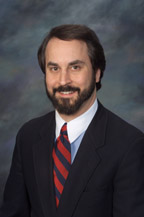
Jeff Stein is an author, historian and broadcaster. A 2011 recipient of The National Award of Merit from the American Association for State and Local History, he is recognized as the foremost broadcast historian in Iowa. His daily radio feature on Iowa history, “Iowa Almanac”, airs on 30 stations statewide. A past member of the State Historical Society of Iowa board of trustees, Stein taught at the college level for 25 years, including at Iowa State University, Buena Vista University-Marshalltown Center, William Penn University and Wartburg College. His book Making Waves: The People and Places of Iowa Broadcasting is the only comprehensive history ever published of radio and television and their impact on the state of Iowa, while One Week in June: The Iowa Floods of 2008 was a Barnes & Noble #1 best seller. His latest book is The Floppy Show, telling the story of the iconic Iowa children’s television program. Stein has also produced a number of award-winning radio and television documentaries, including “From the Battlefront to the Homefront: Iowa Broadcasters Go To War,” which was produced with HI support. His daily interview program can be heard weekday mornings on News/Talk 1540 KXEL, a legendary 50,000-watt radio station based in Waterloo, where he serves as news and program director.
Making Waves: The People and Places of Iowa Broadcasting
Radio and television exploded onto the scene in the 20th century and completely changed our lives. Today, we can hardly imagine a day without broadcasting. The development of radio and TV in Iowa was groundbreaking, and became
the model followed by the rest of America. In his presentation “Making Waves: The People and Places of Iowa Broadcasting”, based on his book by the same name, broadcaster and educator Jeff Stein takes us back to the earliest
days of both radio and television, highlighted by original broadcasts, photos and memorabilia. The presentation is also specifically tailored for different geographic areas of the state, and is designed to allow audience
members to recall special memories and shared experiences.
From the Battlefront to the Homefront: Iowa Broadcasters Go To War
The bravery of American military members has been well-documented, often due to the unique reporting done by Iowa-based broadcasters on the scene. This presentation includes segments from a documentary by the same name, featuring
vintage broadcasts and interviews with the journalists who covered conflicts from World War II to the first Gulf War: a 50-year span. Iowa broadcast historian Jeff Stein, the documentary producer, tells of the challenges
the reporters faced in doing their jobs relaying information to a waiting audience and, at times, reassuring them of the safety of Iowans serving thousands of miles away.
Where’s Floppy? Celebrating an Iowa Television Icon
(new in 2021)For 30 years, from 1957-1987, Duane Ellett and his puppet Floppy delighted audiences of all ages on WHO-TV in Des Moines and at
the Iowa State Fair. Children would call out “Where’s Floppy?”—and ventriloquist Ellett would bring his alter ego to life. From cartoons to riddles (“Why did the man put his car in the oven? Because he wanted a hot rod.”)…celebrity
guests to banter with wide-eyed children…“The Floppy Show” was must-watch television, and wearing a Floppy t-shirt was the height of fashion. Broadcaster and historian Jeff Stein has produced a series of “Duane & Floppy”
DVDs, and shares favorite moments from the television series and photos from his book, “The Floppy Show”.
Iowans You Should Know: Stories from the Iowa Almanac (new in 2021)
Did you know that the Eskimo Pie® was invented in Iowa? So was the electric razor, the clip-on bow tie, and the self-filling fountain pen. Iowa was also the childhood home of four Academy Award®-winning performers, and three
different Iowa-born musical acts had national #1 pop songs in the 1950s alone. In his presentation “Iowans You Should Know: Stories from the Iowa Almanac”, broadcaster, historian and author Jeff Stein tells the stories of
the famous and not-so-famous. From elected officials who prevented presidential impeachment, to record-setting athletes…from famous firsts to displays of strength and grace under pressure…these biographical stories are as
inspirational as they are informative. Stories are culled from Stein’s daily “Iowa Almanac” radio segments, which air on 30 stations across Iowa. The presentation is also specifically tailored for different geographic areas
of the state, to enhance the connection with audiences.
Jennifer Sterling
The University of Iowa
Phone: 319-384-3490
Email:
jennifer-sterling@uiowa.edu

Jennifer Sterling is a Lecturer in the Sport Studies program in the Department of American Studies at the University of Iowa. A small-town Iowa native (Fremont), she completed her undergraduate degree at Central College (Pella) and returned to her home state after completing a postdoctoral fellowship at Georgia Institute of Technology, and degrees at the University of Maryland (PhD) and Seattle Pacific University (MA). She teaches courses on sport in Iowa, inequality in American sport, sport technology, sport history and the Olympics.
6-on-6 Girl’s Basketball in Iowa: Traditions, Transitions, and Legacies
For most of the 20th century, Iowa was known for its devotion to a unique form of women’s sport known as 6-on-6 girls’ basketball. As other states abandoned 6-on-6 in the 1970s, Iowa remained committed to this half-court game until 1993, when the final 6-player championship was held. This multi-media presentation recounts Iowa’s 6-on-6 history, connects it to the development of girls’ and women’s sport in the United States, and welcomes audience members to share their own stories and collections.
Larry Stone
Elkader
Phone: (563) 245-1517
Email:
lstone@alpinecom.net
Website:
www.larrystonesiowa.com

Larry Stone’s boyhood fascination with the creeks and woodlots on his family’s southern Iowa farm brings authenticity to his nature photography, writing and lectures. With degrees in biology and journalism, he also understands the natural world and can communicate the wonders of outdoor experiences. During a 25-year career with the Des Moines Register, from 1972-1997, Larry traveled throughout Iowa, sharing stories and photos of the state’s natural treasures.
His work also has appeared in The Iowan, Iowa Natural Heritage, Pheasants Forever, Our Iowa and other magazines. Larry has received awards from the Iowa Wildlife Federation, the Iowa Chapter of the Sierra Club, the Iowa Sportsmen’s Federation, the Iowa Division of the Izaak Walton League of America, the Association of Earth Science Editors, the International Regional Magazine Association and the Outdoor Writers Association of America. He is a member of the Clayton County Conservation Board. Larry and his wife, Margaret, live near Elkader, where they manage woodlands, native prairie and reconstructed prairie on a farm along the Turkey River. Larry also operates a small business specializing in natural history books.
Gladys Black: The Legacy of Iowa’s Bird Lady
The late Gladys Black of Pleasantville was widely known throughout Iowa as a conservationist, educator and amateur expert on birds. Larry and co-author Jon Stravers have written a book about Gladys. Larry’s slide program
acknowledges this colorful woman’s impact on so many Iowans.
Whitetail: Treasure, Trophy or Trouble?
Although Iowa’s original deer herd vanished in the face of white settlement, the animals rebounded during the 20th century to the point of overpopulation. Adapted from a 2003 book written for the Iowa Department of Natural
Resources, “Whitetail” traces that history. It’s a story with broad appeal to farmers, hunters, motorists and wildlife watchers—anyone whose life has been affected by Iowa deer.
Iowa: Portrait of the Land
Based on Larry’s award-winning Earth Year 2000 book for the Iowa Department of Natural Resources, “Portrait” is a reminder to Iowans of the rich history of their natural resources, with an appeal for protecting
that heritage.
Jody Swilky
Des Moines
Phone: (515)-710-3667
Email:
Jody.swilky@drake.edu
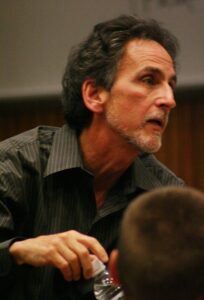
During his thirty years at Drake University, Jody Swilky was the Ellis and Nelle Levitt Distinguished Professor of English, and he served as Director of Cultural Studies. He wrote and co-produced the award-winning documentary A Little Salsa on the Prairie: The Changing Character of Perry, Iowa, which has had over 50 screenings in the U.S and Mexico, been featured at film festivals, and shown on Iowa Public TV and The Documentary Channel. He also served as head researcher/consultant for the The Fort: 177 Years of Crime and Punishment at Iowa State Penitentiary. Lecturing widely, he has focused his presentations on immigration to Iowa, and his writing and film work have received grants from the National Endowment for the Humanities, Humanities Iowa, Iowa Arts Council, and The Bock Family Foundation.
Lectures and workshops
Jody Swilky is available to lead script-writing workshops for television and film, focusing on documentary and dramatic productions. He welcomes invitations to lecture on the relationship between immigration, industry and ethnicity in Iowa, with or without public screenings of his documentary on the subject.
Diversity in Iowa: The Case of Perry, Iowa
This lecture will capture the effects of demographic change on a once predominantly white rural communitity in Iowa beginning in the 1980s and still having impact today. The presentation will examine the evolving character
of Perry, Iowa, prior to , during, and after the making of A Little Salsa on the Prairie: The Changing Character of Perry, Iowa , an award-winning documentary I wrote and co-produced that captures what happens when a community
changes dramatically because of rapid ethnic diversification. The lecture will focus on the challenges, benefits, and accomplishments residents of Perry had to recognize and work through to sustain the community, and connects
this culture change to national socioeconomic circumstances that led to such transformation. Footage from the aforementioned documentary will be part of the presentation which will be followed by a question-and-answer session.
Rich Tyler
Iowa City
Work Phone: (319) 356-2471
Home Phone: (319) 337-2544
Email:
rich-tyler@uiowa.edu
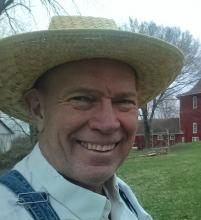
Rich Tyler has been restoring the Secrest farmstead and octagonal barn near West Branch. He has researched the history behind the property, including the golden age of farming, the Depression and the architecture of barns. Rich is a Professor in the Departments of Otolaryngology—Head and Neck Surgery and Speech Pathology and Audiology at the University of Iowa.
If Barns Could Talk
Old barns are more than just solid functional buildings. They represent the soul of our farming heritage and perhaps more! What is a barn, architecturally and emotionally? Barn design was based on experience, needs and ambition.
Their function indicated both the farm operation and the farmer’s personal touch. Barn construction was a community affair comprised of hard work, huge meals and a barn dance. Few of us today have the products of our labor
on display for all to see, appreciate and criticize. But what’s happening to our old barns? Will metal replace wood? Can we smell and touch the metal in the same fashion? What does our interest in barns tell us about ourselves?
Why should we care about old barns today? These and other questions will be discussed as the history and current importance of barns are explored.
Your Grampa and Gramma’s Farm
Farming in the late 1800s and early 1900s represents a lifestyle of hard work, inventions, prosperity and depression. This presentation focuses on a typical farmer, Joshua Secrest, who developed a successful livestock farm.
It also reviews the dramatic development of ingenious farm machinery and tools that enabled growth and prosperity. Secrest built a large octagonal barn in 1883. The barn and farmstead were lost in the depression. Old farm
tools are shared as part of the presentation. Some you won’t recognize.
Why Save an Old Barn?
Should we let them fall down? What is the real value of preserving our past? The example used in this presentation is the restoration of The Secrest 1883 Octagonal Barn. A story is told about how individuals and organizations
rallied around Iowa farm history, to contribute to the saving of this barn. The barn is open to the public, and photographers, artists and school children have all played an important role. How can you save your barn? What
will they mean to future generations who grow up without them?
Sarah Uthoff
Iowa City Phone: (319) 351-2100
Email:
uthoff@mchsi.com
Youtube:
www.youtube.com/user/Trundlebedtales
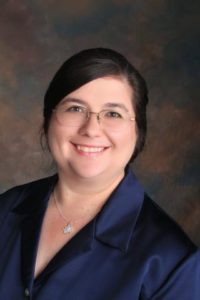
Sarah Uthoff received both her history education BA and her Masters of Library Science from the University of Iowa. She is the former director of the Oxford Public LIbrary in Oxford, Iowa, and currently serves as a reference librarian at Kirkwood Community College in Cear Rapids, Iowa. An active Laura Ingalls Wilder researcher, Sarah is a regularly-featured speakers at the annual Laura Ingalls Wilder Remembered Day at the Herbert Hoover Presidential Library in West Branch. She has spoken at five of the Laura Ingalls Wilder sites located in Pepin, WI; Independence, KS; Walnut Grove, MN; Burr Oak, IA; and De Smet, SD.
Sarah’s consulting work has included designing the Laura Ingalls Wilder Girl Scout Patch Day at Usher’s Ferry Historic Village in Cedar Rapids and a training session for the staff at the Laura Ingalls Wilder Museum in Burr Oak, Iowa. Her unique programs can be customized for the type of group (adults, children, mixed), and the type of presentation desired. Sarah can present as a modern day reseracher or constumed as either a young or older Laura. Find Sarah all around the web at http://about.me/sarah_uthoff
General Laura Program
The basic Laura Ingalls Wilder program gives a general overview of Laura’s life. It features slides taken at all the Laura sites and is good for any age group.
Packing Up
Look in on Laura Ingalls Wilder as she is packing up to move to Missouri. Each artifact in the old chest holds a story.
In the Kitchen with Laura
In the Kitchen With Laura mixes stories and information about Laura Ingalls Wilder’s life with food history and hands-on cooking. It’s the 1930s and we find ourselves in Laura’s kitchen as she’s dealing with all the food
coming in from a bountiful summer garden. Catch up with the story of her life while we learn what’s cooking.
Robert Vavra
Phone: (563) 586-2123
Email:
info@MaidenVoyageTours.com

Robert Vavra is a Mississippi Riverboat Captain and the owner and operator of The Maiden Voyage, a working river boat on the Upper Mississippi River. After working for a number of years in commercial Fishing, clamming and trapping, Robert realized a young man should not hitch his wagon to a dying industry. Today, commercial fishing, clamming and trapping has all but disappeared. He witnessed the death of these industries.
The Day of the Hunter-Gatherer
A hands-on, interactive experience covering the following topics:
Marquette and Joliet—the role they played on the Upper Mississippi River.
Early Fur Industry—trading with Native Americans and the hatting industry.
Clamming Industry—Mother of Pearl buttons.
Pearling Days—world’s finest freshwater pearls.
The Cultured Pearl Industry—Mother of Pearl clam shell beads.
Fishing as a way of life—the rough fish industry.
The Old World way of clamming and fishing.
New technologies—new ways to fish, new ways to use the fish.
Health and Status of the Great Mississippi River—invasive species.
Michael Vogt
Des Moines
phone: 515-252-4531
email:
mmm_iowa@hotmail.com

Michael Vogt, a native of Gladbrook, Iowa, is presently a curator for the Iowa Gold Star Military Museum at Camp Dodge, in Johnston, Iowa. He earned a Bachelor’s Degree in history with a secondary teaching endorsement in 1991 and a Master’s Degree in United States history in 1997 from the University of Northern Iowa. He served on the Board of Directors as a volunteer and board chair for the Iowa Museum Association and the State Historical Society of Iowa Board of Trustees. Past work experience includes employment as museum director for the Historical Society of Marshall County, Iowa, site supervisor at Living History Farms in Urbandale, Iowa, and assistant instructor at the Center for American Archaeology in Kampsville, Illinois. In addition, he has taught as an adjunct history instructor for Grand View University, Simpson College, and Buena Vista University. Mike has published articles on American and military history in magazines, newspapers, journals, and books including Iowa Heritage Illustrated, The Iowan, the Des Moines Register, Iowa History Journal, and The Biographical Dictionary of Iowa. Upon completion of FAA ground school and flight training he received a pilot license in 2009.
Camp Dodge: Home Away from Home 1917-1918
Following the U.S. entry into World War I the War Department undertook the task of raising, training, equipping and arming a force large enough to successfully contribute the Allied war effort. Camp Dodge, Iowa, was selected
as one of 16 training camps for draftee soldiers. The small Iowa National Guard camp was expanded into the largest military base in Iowa’s history. the upper Midwest.
With a PowerPoint slide show presentation, viewers will learn how, from September 1917 through November 1918, 37,111 Iowa draftees left cities, towns and farms to become soldiers during the First World War. Period images,
maps, letters, and data will detail how many of many of these Iowans left home for the first time. For these Iowans and other inductees from the upper Midwest, Camp Dodge became their new “Home Away from Home.”
Company M, 7th U.S. Infantry Immunes during the Spanish-American War
Described by Secretary of State John Hay as a “Splendid Little War” the war with Spain became of the most popular conflicts in U.S. history. Among the troops raised for service was Company M, 7th Immunes from Des Moines. Thought to be immune from tropical diseases due to their African-American heritage, enthusiastic black volunteers joined the U.S. Army for service in Cuba. A PowerPoint slide show presentation will acquaint participants with examples of local and national racism faced by black soldiers serving in a segregated army and how these Iowans persevered and performed their duty honorably and with great credit upon their home state.
Phillip Webber
Pella
Phone: (515) 628-4271
Email:
webberp@central.edu
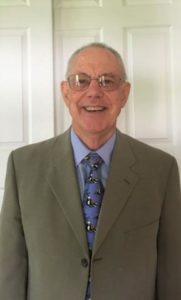
Phil Webber is Professor Emeritus of German and Linguistics at Central College in Pella. A primary focus of his on-site research has been patterns of ethnicity and language use in Iowa communities.
Iowa’s Cultural Kaleidoscope
This program presents a rich selection of photographic images that document recent immigration to Iowa from areas as diverse as Africa, Eastern Europe, Asia and Latin America.
Jeff Stein
Phone: (319) 230-8988
Email:
jeff.stein@mail.com

Jeff Stein is an author, historian and broadcaster. A 2011 recipient of The National Award of Merit from the American Association for State and Local History, he is recognized as the foremost broadcast historian in Iowa. His daily radio feature on Iowa history, “Iowa Almanac”, airs on 30 stations statewide. A past member of the State Historical Society of Iowa board of trustees, Stein taught at the college level for 25 years, including at Iowa State University, Buena Vista University-Marshalltown Center, William Penn University and Wartburg College. His book Making Waves: The People and Places of Iowa Broadcasting is the only comprehensive history ever published of radio and television and their impact on the state of Iowa, while One Week in June: The Iowa Floods of 2008 was a Barnes & Noble #1 best seller. His latest book is The Floppy Show, telling the story of the iconic Iowa children’s television program. Stein has also produced a number of award-winning radio and television documentaries, including “From the Battlefront to the Homefront: Iowa Broadcasters Go To War,” which was produced with HI support. His daily interview program can be heard weekday mornings on News/Talk 1540 KXEL, a legendary 50,000-watt radio station based in Waterloo, where he serves as news and program director.
Making Waves: The People and Places of Iowa BroadcastingRadio and television exploded onto the scene in the 20th century and completely changed our lives. Today, we can hardly imagine a day without broadcasting. The development of radio and TV in Iowa was groundbreaking, and became the model followed by the rest of America. In his presentation “Making Waves: The People and Places of Iowa Broadcasting”, based on his book by the same name, broadcaster and educator Jeff Stein takes us back to the earliest days of both radio and television, highlighted by original broadcasts, photos and memorabilia. The presentation is also specifically tailored for different geographic areas of the state, and is designed to allow audience members to recall special memories and shared experiences.
From the Battlefront to the Homefront: Iowa Broadcasters Go To War
The bravery of American military members has been well-documented, often due to the unique reporting done by Iowa-based broadcasters on the scene. This presentation includes segments from a documentary by the same name, featuring
vintage broadcasts and interviews with the journalists who covered conflicts from World War II to the first Gulf War: a 50-year span. Iowa broadcast historian Jeff Stein, the documentary producer, tells of the challenges
the reporters faced in doing their jobs relaying information to a waiting audience and, at times, reassuring them of the safety of Iowans serving thousands of miles away.
Where’s Floppy? Celebrating an Iowa Television Icon
(new in 2021)For 30 years, from 1957-1987, Duane Ellett and his puppet Floppy delighted audiences of all ages on WHO-TV in Des Moines and at
the Iowa State Fair. Children would call out “Where’s Floppy?”—and ventriloquist Ellett would bring his alter ego to life. From cartoons to riddles (“Why did the man put his car in the oven? Because he wanted a hot rod.”)…celebrity
guests to banter with wide-eyed children…“The Floppy Show” was must-watch television, and wearing a Floppy t-shirt was the height of fashion. Broadcaster and historian Jeff Stein has produced a series of “Duane & Floppy”
DVDs, and shares favorite moments from the television series and photos from his book, “The Floppy Show”.
Iowans You Should Know: Stories from the Iowa Almanac (new in 2021)
Did you know that the Eskimo Pie® was invented in Iowa? So was the electric razor, the clip-on bow tie, and the self-filling fountain pen. Iowa was also the childhood home of four Academy Award®-winning performers, and three
different Iowa-born musical acts had national #1 pop songs in the 1950s alone. In his presentation “Iowans You Should Know: Stories from the Iowa Almanac”, broadcaster, historian and author Jeff Stein tells the stories of
the famous and not-so-famous. From elected officials who prevented presidential impeachment, to record-setting athletes…from famous firsts to displays of strength and grace under pressure…these biographical stories are as
inspirational as they are informative. Stories are culled from Stein’s daily “Iowa Almanac” radio segments, which air on 30 stations across Iowa. The presentation is also specifically tailored for different geographic areas
of the state, to enhance the connection with audiences.

David Thoreson is one of America’s preeminent explorers of our time and will take you on an extraordinary adventure. Over The Horizon is his compelling story and visual memoir. The sailor from Lake Okoboji, Iowa, was an experienced adventure traveler when he began sailing the high seas with a “salty” hog farmer from southern Minnesota. Together they began exploring the far reaches of the globe. On their second attempt at crossing the Arctic’s Northwest Passage, Thoreson realized they were witnessing a rapidly changing Arctic and ocean environment.
With his many extreme expeditions and Midwestern roots, photographer, sailor, and explorer David Thoreson has a unique life story. His path has been anything but traditional. Thoreson grew up in Algona, Iowa, learned to sail and love the water as a boy on the Iowa Great Lakes. He shares how these experiences led to a life of exploration and discovery at the far reaches of the globe. David’s book and presentation combine stunning visuals and storytelling about sailing in the ice, lives of native hunters, scientists in the Arctic and teamwork in the face of grave danger.
David Thoreson is an Explorers Club National Fellow and the first American explorer in history to sail the Northwest Passage in both directions. Thoreson has sailed more than 75,000 nautical miles, including be¬low the Antarctic Circle, three times across the Atlantic, seven times over the Arctic Circle, twice around Cape Horn and, in 2009-10, a 28,000-mile circumnavigation of North and South America. His documentary of that voyage was nominated for an Emmy and published in the beautiful photo book, One Island, One Ocean. David assisted the 2022-23 National Geographic expedition to the Northwest Passage aboard the sailboat Polar Sun for the August 2023 cover story.
Now a sought-after speaker on polar, ocean and conservation issues, Thoreson has shared his observations at the National Press Club, World Science Festival, TEDx, Nobel Peace Prize Forums, Explorers Club, universities, and institutions across the world.
Personal Adventures and Explorations of the Northwest Passage
The presentation includes stories of David’s three Arctic expeditions aboard small sailboats and the quest for the infamous Northwest Passage. He begins with the 1994 passage attempt aboard the 57′ s/v Cloud Nine in which
the crew became trapped in the ice and barely escaped. Thirteen years later, in 2007, David and crew were successful in traveling along famed explorer Roald Amundsen’s route and became the first American sailboat in history
to accomplish this feat. In 2009, he was ice expert and documentary photographer on the scientifically-equipped, 64′ s/v Ocean Watch which accomplished the Northwest Passage from west to east. David became the only American
sailor in history to transit the infamous passage in both directions.
David tells adventure stories visually, stitching voyages together and including brief histories, photography and landscape, trip planning, ice charts, wildlife, native villages and changes in the environment contributing
to loss of Arctic ice.
Sailing Around the Americas, a 28,000-Mile Small Boat Journey
In 2009-10, David was selected to be the documentary photographer and filmmaker on a 13-month, 28,000-mile sailing circumnavigation of the North and South American continents. The educational and scientific voyage was designed
to raise awareness in the public and highlight many important ocean and sea issues. David took over 75,000 images during the sailing adventure and this is a stunning visual presentation.
The Northwest Passage in the Era of Climate Change
This presentation includes a more in-depth look at the science of climate change with the emphasis on the Arctic. Using David’s unique northern experiences, he explores the state of the polar ice cap, changes in native villages,
culture, tourism, resource development and the northern sea routes with increasing shipping and commerce in the Arctic. Why is the Arctic considered the epicenter of the climate debate? What is the future of the Northwest
and Northeast Sea Passages? David will explore the many questions and host a lively discussion.
Equipment required: Screen, microphone (larger venues)
Over The Horizon: A Life of Ocean and Polar Exploration
Join the crew and explore with Thoreson sailing to Antarctica and the Arctic Ocean’s Northwest Passage aboard the sailboats Cloud Nine and research vessel Ocean Watch. David will share stories of his many polar adventures over the past thirty years including his historic 28,000-mile circumnavigation of the N/S American Continents, working with NASA, NOAA and world-renowned scientists. David will introduce you to a life of exploration and many of the characters he has encountered at the ends of the earth through riveting stories and stunning photography.
Needs: Projector/Screen or Smart TV, handheld or lapel mic, podium, or table for laptop.
Jody Swilky
Des Moines
Phone: (515)-710-3667
Email:
Jody.swilky@drake.edu

During his thirty years at Drake University, Jody Swilky was the Ellis and Nelle Levitt Distinguished Professor of English, and he served as Director of Cultural Studies. He wrote and co-produced the award-winning documentary A Little Salsa on the Prairie: The Changing Character of Perry, Iowa, which has had over 50 screenings in the U.S and Mexico, been featured at film festivals, and shown on Iowa Public TV and The Documentary Channel. He also served as head researcher/consultant for the The Fort: 177 Years of Crime and Punishment at Iowa State Penitentiary. Lecturing widely, he has focused his presentations on immigration to Iowa, and his writing and film work have received grants from the National Endowment for the Humanities, Humanities Iowa, Iowa Arts Council, and The Bock Family Foundation.
Lectures and workshops
Jody Swilky is available to lead script-writing workshops for television and film, focusing on documentary and dramatic productions. He welcomes invitations to lecture on the relationship between immigration, industry and ethnicity in Iowa, with or without public screenings of his documentary on the subject.
Developing Scripts: A Workshop on the Fundamentals of Writing Scripts for Film and Television
In two 90-minute workshop sessions , participants will be introduced to the fundamental structural components of scripts, including the establishing sequence, exposition, climax, and resolution. We will move on to writing exercises for developing a synopsis, treatment, script proposal, and if time allows, drafts of scripts. The sessions will involve
lecture, time for individual writing, and group work so participants can share and learn from each other about the possibilities for script writing .
Danuta Hutchins
Storm Lake
Phone: (712) 732-6779
Email:
hutchinsd@bvu.edu

Danuta Zamojska Hutchins, of Storm Lake, was born in Warsaw, Poland and experienced the ravages of Nazi occupation, their reprisals for the Warsaw Uprising of 1944 and Poland’s fall to communism after its liberation by the
Soviet Army. Dr. Hutchins left Poland in 1962 to study American literature and language at the University of Minnesota. She received her Ph.D. in Modern Languages, Education and Linguistics from the University of Minnesota,
Minneapolis. Dr. Hutchins has taught Slavic Languages, Literatures and Cultures at Buena Vista College (now University) at Storm Lake, Iowa; Indiana University at Bloomington, Indiana; Iowa State University at Ames, Iowa
and Ohio State University at Columbus, Ohio. She has also taught courses in German Language, Literature and History and Russian Language and Literature at Teikyo-Westmar University and Westmar University at Le Mars, Iowa
from which she retired at its closure in 1995. She has authored many papers and book chapters in her field and has written four books of general interest. Her early retirement enabled her to devote her time to her artwork,
resulting in several successful group and solo exhibits of paintings, etchings and sculpture.
Dr. Hutchins and her husband, a professor of Chemistry at Buena Vista University in Storm Lake, have two grown children, Edward and Maria.
The Butterfly Effect: Why Do We Feel Empathy with the Victims of War, Hunger, Terror and Natural Disasters?
Referring to her book, “Torn Out Memories,” Dr. Hutchins tells the experiences of a child living under the Nazi occupation of Poland and during the Warsaw Uprising. She relates her personal trauma to the terrors suffered
by the victims of 9/11 attacks.
Herbert Hoover’s Role in Distributing Food in Post WWI and WWII in Europe
As a child, Dr. Hutchins experienced firsthand President Hoover’s distribution of food in Poland after WWII. A chapter in her book, “Torn Out Memories,” gives details of those experiences and her connection with the Hoover
birthplace in West Branch.
Sacred and Profane Art Presented in Power Point
are the issues and images of the human body in European art of the Middle Ages through the present. Images selected include examples of figurative paintings, drawings and caricature, as well as sculpture. Discussion centers
on both the aesthetic and the philosophic considerations of the human image as a vehicle of veneration and beauty versus that of scorn and distortion.
Flowers of the Prairie
With a copy of the “Prairie and Woodland Flowers Coloring Book” as reference, this presentation identifies prairie wildflowers, their common English names and Linnaeus-based classification in Latin. It informs when they blossom,
where they grow and what medicinal and food uses have they served during the times of early pioneers and Native American Peoples. With the “hands-on” component of drawing/coloring images of those flowers, this presentation
can be taken to the local prairies or prairie gardens and tailored to specific ages and interests upon request.
Understanding and Reading Slavic Poetry in English Translation
This presentation includes recitation and discussion of poems and short poetic works written by the most outstanding contemporary Slavic authors, centered especially on women poets. Discovering some intimate details in their
biographies and significant events surrounding them and their epoch enhance the understanding of selected works and bring these poets to life. Some humorous commentaries on the idiomatic and cultural differences between the
works’ original language and that of the English translation provide a glimpse into the task of literary transposition from a very personal vantage point by Danuta Hutchins, herself a poet and published translator of many
poetic works into and from the English language.
Bill Koch
Cedar Falls
Work Phone: (319) 273-6231
Home Phone: (319) 233-9137
Email: william.koch(at)uni(dot)edu
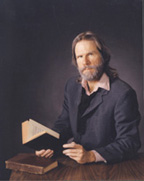
Bill Koch received a Ph.D. in American Studies from St. Louis University and is an adjunct professor in the Department of English Language and Literature at the University of Northern Iowa. He has been a Whitman re-enactor since 1997, appearing at various Civil War encampments in Iowa, and presenting his show “Walt Whitman Live!!” in numerous venues, including the Old State Capital in Springfield, Illinois. A portion of this show can be seen online at Mickle Street Review‘s website http://micklestreet.rutgers.edu/1.mov
Walt Whitman Live!!
In this one hour program, Walt Whitman, portrayed by Dr. Bill Koch, will highlight major poems from his poetry collection, Leaves of Grass. In addition, Whitman will pay tribute to Abraham Lincoln with a description
of the nation’s obsequies and recitations of the Gettysburg Address and “O Captain, My Captain.”
Prairie Whitman
Walt Whitman’s poetry of nature is highlighted. In this presentation, we see an older Whitman, as portrayed by Koch, hobbled by a stroke but finding strength from his contact with trees, babbling brooks, the prairie and the
night sky. The show can be done with little technical support, although it can also be staged in theater-like settings.
Brooks Landon
Iowa City
Phone: (319) 335-0454
Email:
brooks-landon@uiowa.edu
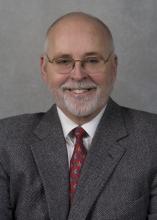
Brooks Landon is a Professor in the University of Iowa English Department, where he teaches courses on contemporary literature, including science fiction, and a Prose Style course devoted entirely to the many forms sentences can take. He is currently fascinated by the apocalyptic turn in contemporary postmodern fiction, and has become something of an expert in forms taken by our current fascination with zombies, devoting a course, “Dead is the New Alive” to the question: Why do we apparently need all these zombie stories? His postmodern fiction course, “Masters of Disaster,” focuses on the many kinds of non-zombie apocalypses that have recently appeared in literary fiction. His Prose Style course is built around his book, Building Great Sentences: How to Write the Kinds Sentences We Love to Read. Landon earned his PhD from the University of Texas at Austin and has been at Iowa since 1978.
A User’s Guide to Postmodern Fiction
Postmodernism means many different things in many different contexts. Postmodern architecture is not the same as postmodern fiction and postmodern fiction comes in more flavors than a well-known ice cream purveyor has flavors.
Postmodern fiction comes after modern fiction, but modern fiction still gets written. Postmodern fiction is a reaction against modern fiction, but still shares many of its concerns and characteristics. Postmodern fiction
is a mess. And, whatever it was, it’s almost certainly over, possibly replaced by a sensibility that is post 9/11.
For purposes of this talk—but without relying too heavily on critical jargon, I’ll consider postmodernism largely in terms of Lyotard’s description of it as a resistance to meta-narrative (“big” narratives that claim to explain
everything, such as religion or Marxism) and of Jameson’s description of it as a “cultural dominant” (an attitude or atmosphere that pervades everything). More specifically, I define postmodernism as the culture of the easy-edit,
a time when science and technology allow us to change just about anything. And I define postmodern fiction as fiction that rises from or responds to postmodern culture.
It’s probably more accurate to speak of postmodernisms than of a single postmodernism and it’s almost certainly more accurate to speak of postmodern fictions than of a single postmodern fiction. So, I’ll be talking about
a fair number of novels that approach postmodern concerns from a fair number of different angles—books by familiar authors such as David Foster Wallace, Thomas Pynchon and Don DeLillo, as well as books by younger and lesser
known authors such as William Gibson, Jonathan Lethem, Chuck Palahniuk, Mark Leyner and Max Brooks. My goal will be to create a broad context in which readers can more specifically place some of their own favorite authors
and have a better idea of what they are up to.
Building Better Sentences: A Quick and Dirty and Pretty Much Grammar-Free Guide to More Effective Writing
Best-selling and critically acclaimed American novelist Don DeLillo has written: “This is what I mean when I call myself a writer. I construct sentences.” And Pulitzer Prize winner Michael Cunningham has written: “I’m still
hoping to write a great sentence. If I do, I’ll let you know.” I will show how attention to a very few ideas can help anyone write better sentences. This is a talk about all the important ways sentences get longer—and shorter.
We will learn about how they work, what they do and how we can think and talk about them in ways that will help both our own writing and our reading. Our concern will be with stretching our sense of options—all the things
a sentence can be and/or do—not a trudge toward grammatical correctness and avoidance of errors, but a dance with language, a celebration of the gift of style.
Barbara Lounsberry
Cedar Falls
Work Phone: (319) 939-6513
Email:
Lounsberry@gmail.com

Barbara Lounsberry recently retired as a Professor of English at the University of Northern Iowa. She was named the University’s Distinguished Scholar in 1994 and its Outstanding Teacher in 1998. She is particularly interested
in the subjects of Midwestern life and literature. Born and raised in Iowa, Professor Lounsberry believes Iowa culture, like its soil, is incredibly rich.
Barbara is pleased to deliver her presentations on Zoom or in-person.
Yup…Nope…and Why Midwesterners Don’t Say Much
The writer Ernest Hemingway made a virtue of Midwestern reserve. Reticence became part of the Hemingway “code,” and the strong, silent type came to be associated with honor and heroism. This half-in-jest, whole-in-earnest
presentation (with slides) explores the historical roots of Midwestern reserve, along with contemporary illustrations. As one Midwesterner deadpanned on return from the East: “We think we are being polite when we wait for
people to finish their sentences; they think we are slow-witted.”
Nancy Drew: Iowa’s Heroine to the World
Nancy Drew is the most popular female detective in fiction. Few know, however, that Nancy is an Iowa heroine and that her creator was Mildred Augustine of Ladora. Nancy Drew and Mildred Augustine are extraordinary role models
for Iowa girls and boys, women and men. An academic pioneer (the first woman to earn a master’s degree from the University of Iowa’s School of Journalism), Augustine earned six airplane pilots’ licenses, including one for
sea-planing, wrote 130 stories for young people and wrote her newspaper column, “On the Go,” until her death at age 98. Augustine wrote in the first Nancy Drew volume, The Secret of the Old Clock, published
in 1930, “Nancy Drew took pride in the fertility of her state and saw beauty in a crop of waving green corn as well as in the rolling hills and the expanse of prairie land.” This program, with lots of images, is meant to
inspire young and old.
The Charm of Diaries
This multi-image program describes the value of diaries as history, literature and more. Part of the charm of diaries and journals is that they come today in so many different forms—from the much-too-small 5-year locked diary
to today’s blogs. One doesn’t have to write every day to be a sublime diarist. The program celebrates some of Iowa’s most famous diarists.
Debra Marquart
Iowa Poet Laureate
Iowa State University
515-290-7731
marquart@iastate.edu

Debra Marquart is a Distinguished Professor of Liberal Arts and Sciences at Iowa State University and Iowa’s Poet Laureate. Her work explores the relationship between the spoken word, the literary arts, storytelling, and music. Marquart has published six books, including Small Buried Things: Poems, and The Horizontal World: Growing up Wild in the Middle of Nowhere, and she continues to perform with her jazz-poetry, rhythm & blues project, The Bone People, with whom she has released two CDs: Orange Parade (folk/rock) and A Regular Dervish (jazz-poetry). Her work has received over 50 grants and awards including a National Endowment for the Arts Fellowship, a PEN USA Nonfiction Award, a New York Times Editors’ Choice commendation, and Elle Magazine’s Elle Lettres Award, and has been featured on the BBC and National Public Radio. She is the senior editor of Flyway: Journal of Writing & Environment, and she teaches creative writing in ISU’s MFA Program in Creative Writing and Environment and in the Stonecoast Low-Residency MFA Program at the University of Southern Maine.
POETRY, MUSIC & THE ENVIRONMENT
Debra Marquart is available to read from her creative work (poetry, fiction, memoir) and to perform music alone, or with her band, The Bone People. A singer-songwriter, Marquart fuses poetry, music, and storytelling in her performances. The topics in Marquart’s five books and ongoing research projects range widely to include the following: agriculture and rural life; music performance and popular music history; immigration and travel; and environmental issues such as oil extraction and climate change.
Kurt Meyer
St. Ansgar
meyer6601@aol.com
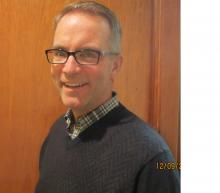
Kurt Meyer’s ancestors preceded Hamlin Garland’s family in moving to and living in Mitchell County, Iowa, where Meyer now lives. Meyer has studied Garland’s life and work extensively, emphasizing the importance of Garland’s
Iowa years, 1868–‘81, between the ages of 8 and 21. Meyer has published two books of essays on Garland, conceived and wrote the forward to “Prairie Visions,” (a book featuring Garland-related photographs), and presented Garland
papers at four American Literature Association conferences. For eight years, Meyer has coordinated annual Garland poetry readings and he has delivered lectures on Garland in dozens of venues in seven states.
Before returning to Iowa, Meyer lived in Appleton, Wisconsin, where he first became interested in Edna Ferber, the community where the Ferber family moved after leaving Ottumwa. It led to an intense examination of Ferber’s
life and times, her circle of friends (including the infamous “Algonquin Roundtable”), as well as her many diverse literary works. While their lives were dissimilar in many respects, Meyer finds familiar patterns in backgrounds
and careers of these two authors—the first two Pulitzer Prize winners with links to Iowa.
Iowa’s Claim to Prize-Winning Authors
Among the distinguished authors with an Iowa connection are Pulitzer Prize winners Hamlin Garland (1860–1940) and Edna Ferber (1885–1968). Both spent significant childhood years in Iowa—Garland in northeast Iowa, and Ferber
in Ottumwa. And both drew on their Iowa backgrounds throughout prolific writing careers.
Meyer’s presentation will introduce people to these two often-overlooked/forgotten authors: their lives, their major works, their pioneering careers, and their importance in the literary world, during their prime years as
well as today. Although they led very different lives, Meyer will focus on shared talents that made them successful and the personal and professional qualities they held in common.
Using Garland and Ferber as examples, Meyer will also suggest informal ways that Iowans can encourage and promote future generations of Pulitzer Prize winners.
Please note: the fee for the first ten scheduled events for this program will be waived under the Democracy and the Informed Citizen Initiative.
This program is part of the Democracy and the Informed Citizen Initiative, administered by the Federation of State Humanities Councils. The initiative seeks to deepen the public’s knowledge and appreciation of the vital connections
between democracy, the humanities, journalism, and an informed citizenry.
We thank The Andrew W. Mellon Foundation for their generous support of this initiative and the Pulitzer Prizes for their partnership.
Monica Schmidt
Phone: (612) 387-3153
Email:
sweeper887@gmail.com
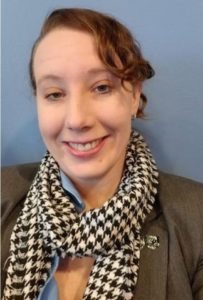
Monica Schmidt, MA, LMHC, IADC, is a licensed mental health counselor specializing in substance abuse treatment. She holds a Bachelor’s in Psychology and Criminal Justice from Mount Mercy College, a Master’s Degree in Counseling Psychology from St. Mary’s University, and another Bachelor’s degree in Cinema Studies and Media Culture from the University of Minnesota. She is the current president of The Younger Stamfords of Iowa City, a Sherlock Holmes literary society, and is a member of multiple Sherlockian societies across the US and Canada, including The Hounds of the Baskerville (sic) and The Adventuresses of Sherlock Holmes (ASH).
Will the REAL Sherlock Holmes please stand up?
A 60-minute presentation delineating the differences between the literary Holmes and the Holmes of pop culture. Filled with movie clips exploring the evolution of the character. Perfect for civic groups — can be shortened to 30 minutes or lengthened to 60 minutes.
The Seven Percent Evaluation
A 40-minute clinical analysis of Sherlock Holmes’s cocaine use throughout the 60 Sherlock Holmes novels and short stories. This presentation seeks to definitively answer the question of “Was Sherlock Holmes an addict?” from a modern viewpoint. Presentation is accessible to both professionals and general lay audiences.
The Curious Case of the Bipolar Detective
A 40-minute exploration into the clinical world of Sherlock Holmes’s mood swings throughout the 60 Sherlock Holmes novels and short stories, while also educating about clinical diagnosis of Bipolar Disorder. Presentation is accessible to both professionals and general lay audiences alike.
Mary Swander
Iowa Poet Laureate (former)
Phone: 319-683-2613
Email:
swandermary@gmail.com
Website:
www.MarySwander.com
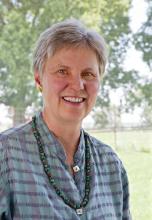
Mary Swander, poet, playwright and non-fiction writer, draws her inspiration from the landscape and its people. From the Iowa Amish to the New Mexico mystics, she has captured the extraordinary folkways and idioms in the ordinary
person’s life.
Mary is not currently available for in-person events. She is pleased to offer the following presentations via Zoom.
Squatters on Red Earth
Mary Swander will lead a discussion about the writing and production of her new work Squatters on Red Earth, a play composed under the guidance of members of the Meskwaki Settlement, and supported by grants from Anon Was a Woman Environmental Art Award (The New York Foundation for the Arts) and The State Historical Society of Iowa, Inc. The drama is a one-man show starring Rip Russell, directed by Brant Bollman. The play explores the issue of the white settler land grab from the Native Americans. The core story revolves around a peaceful encounter between the Meskwakis and the Inspirationists, a German Utopian group, all the while the colonialists were forcing the Natives from their land.
Discussions, Readings and Maybe a Banjo
Mary Swander will talk and discuss the state of poetry in contemporary society, illustrating her ideas with her original work, including the classic “Driving the Body Back” and her recent collection The Girls on the Roof,
a Mississippi River flood saga. The author of twelve books, numerous plays and radio commentaries, Swander brings energy and humor to the page and to her audiences. And sometimes she even brings her banjo.
Responses to Map of my Kingdom and Vang
Mary Swander will provide the cultural and historical contexts surrounding her plays Map of my Kingdom, a drama about farmland transition, and Vang, a drama about recent immigrant farmers. Swander
will detail how she wrote both dramas and she why was compelled to take on these contemporary agricultural issues. Land access is a pressing problem for beginning farmers in the U.S. Over half of the current farmers are over
the age of 65, but will these retiring landowners be able to transition their property to younger folks? Many immigrants come to the U.S. with agricultural knowledge and experience, but find it difficult to set themselves
up in farming. How will they find a piece of the American dream? The audience will be encouraged to ask questions and share their own experiences.
Response to Farm-to-Fork-Tales
Mary Swander will discuss how agriculture is the mother of all arts, and in particular how food and farming give rise to stories of the land and the culinary arts. She will talk about how gardening, cooking, and agriculture
have provided material for her own writing and how family histories about food and farming pinpoint the larger historical markers of our time—from the Irish potato famine, to the Dust Bowl, to our recent immigration raids
in packing plants. Food and farming stories have also released some of the best jokes, tall tales, and humor in American folklore. Audience members will be encouraged to tell their own stories and discuss their significance.
Sarah Uthoff
Iowa City
Phone: (319) 351-2100
Email:
uthoff@mchsi.com
Youtube:
www.youtube.com/user/Trundlebedtales

Sarah Uthoff received both her history education BA and her Masters of Library Science from the University of Iowa. She is the former director of the Oxford Public LIbrary in Oxford, Iowa, and currently serves as a reference
librarian at Kirkwood Community College in Cear Rapids, Iowa. An active Laura Ingalls Wilder researcher, Sarah is a regularly-featured speakers at the annual Laura Ingalls Wilder Remembered Day at the Herbert Hoover Presidential
Library in West Branch. She has spoken at five of the Laura Ingalls Wilder sites located in Pepin, WI; Independence, KS; Walnut Grove, MN; Burr Oak, IA; and De Smet, SD.
Sarah’s consulting work has included designing the Laura Ingalls Wilder Girl Scout Patch Day at Usher’s Ferry Historic Village in Cedar Rapids and a training session for the staff at the Laura Ingalls Wilder Museum in Burr
Oak, Iowa. Her unique programs can be customized for the type of group (adults, children, mixed), and the type of presentation desired. Sarah can present as a modern day reseracher or constumed as either a young or older
Laura. Find Sarah all around the web at
http://about.me/sarah_uthoff
General Laura Program
The basic Laura Ingalls Wilder program gives a general overview of Laura’s life. It features slides taken at all the Laura sites and is good for any age group.
Packing Up
Look in on Laura Ingalls Wilder as she is packing up to move to Missouri. Each artifact in the old chest holds a story.
In the Kitchen with Laura
In the Kitchen With Laura mixes stories and information about Laura Ingalls Wilder’s life with food history and hands-on cooking. It’s the 1930s and we find ourselves in Laura’s kitchen as she’s dealing with all the food
coming in from a bountiful summer garden. Catch up with the story of her life while we learn what’s cooking.
Robert Campagna
Mount Vernon
Email:
abbecreek@aol.com
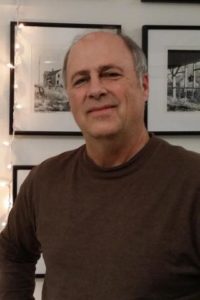
Robert Campagna is a fine art photographer who has taught internationally as well as in several U.S. states. He has created over 500 workshops,
reaching over 12,000 students. For 25 years he created photography workshops in several Iowa communities under the auspices of the Iowa Arts Council. In recent years his workshops have also been available to Colorado students
under the sponsorship of Think 360 Arts. He is a founding member in the Artworks Center for Creative Arts in Loveland, Colorado. A Cedar Rapids native, Campagna has also resided in Dubuque, Iowa City, Muscatine and Mount
Vernon before moving to Colorado in 2007. He has recently returned to his 28-year home of Mount Vernon, Iowa to continue his career and live near family.
He has published four books, including Northeast Iowa (America’s Hidden Treasure), Renascence, the children’s book Grandpa and the Sky, and In Great Spirit (a portrait of Meskwaki and Taos Pueblo).
He also designs and publishes calendars, not cards, posters, postcards and brochures. He has taken over a million images in journalistic as well as fine arts pursuits. He has taught extensively in Iowa, Colorado, New Mexico,
California, Illinois, New York, Wisconsin, Minnesota, Nicaragua and Scotland.
“The Art of Seeing”
This Speakers Bureau presentation will offer Campagna’s professional and expert insight as to how photography may be used for community and publishing purposes. He will discuss, among other topics, how aspiring and long-time photographers alike may view the world as photographers, and simply how to make great adventures through your photography.
Debra Marquart
Iowa Poet Laureate
Iowa State University
515-290-7731
marquart@iastate.edu

Debra Marquart is a Distinguished Professor of Liberal Arts and Sciences at Iowa State University and Iowa’s Poet Laureate. Her work explores the relationship between the spoken word, the literary arts, storytelling, and music. Marquart has published six books, including Small Buried Things: Poems, and The Horizontal World: Growing up Wild in the Middle of Nowhere, and she continues to perform with her jazz-poetry, rhythm & blues project, The Bone People, with whom she has released two CDs: Orange Parade (folk/rock) and A Regular Dervish (jazz-poetry). Her work has received over 50 grants and awards including a National Endowment for the Arts Fellowship, a PEN USA Nonfiction Award, a New York Times Editors’ Choice commendation, and Elle Magazine’s Elle Lettres Award, and has been featured on the BBC and National Public Radio. She is the senior editor of Flyway: Journal of Writing & Environment, and she teaches creative writing in ISU’s MFA Program in Creative Writing and Environment and in the Stonecoast Low-Residency MFA Program at the University of Southern Maine.
POETRY, MUSIC & THE ENVIRONMENT
Debra Marquart is available to read from her creative work (poetry, fiction, memoir) and to perform music alone, or with her band, The Bone People. A singer-songwriter, Marquart fuses poetry, music, and storytelling in her performances. The topics in Marquart’s five books and ongoing research projects range widely to include the following: agriculture and rural life; music performance and popular music history; immigration and travel; and environmental issues such as oil extraction and climate change.
Dennis Goldford
Drake University
Work Phone: (515) 271-3197
Home Phone: (515) 225-7291
Email:
dennis.goldford@drake.edu

Dennis Goldford has been at Drake University since 1985, teaching in the areas of political and constitutional theory. With his active interest in American politics, Professor Goldford regularly serves as a political analyst
for KCCI-TV in Des Moines and is asked frequently to comment on current political matters by Iowa Public Radio and other various media organizations.
Dr. Goldford is co-author, with Hugh Winebrenner, of the new, 3rd edition of The Iowa Caucuses: The Making of A Media Event (University of Iowa Press), and, most recently, author of The Constitution of Religious Freedom: God, Politics, and the First Amendment (Baylor University Press).
Dr. Goldford is pleased to speak at venues via Zoom or within a 60-mile drive (one-way) from Des Moines.
Political Polarization: It’s Ugly, and There’s No End in Sight
American politics has entered a troubling if not potentially dangerous era that erupted in the 2020 elections, but this era did not begin and will not end with the Trump presidency. Why? This presentation will discuss the
major factors that have led to our current political conflicts and the challenges we now face.
Scott Samuelson
Iowa State University
Email: scotts@iastate.edu

An award-winning philosopher and writer known for bringing philosophy to the public, Scott Samuelson is the author of three books: Rome as a Guide to the Good Life (2023), Seven Ways of Looking at Pointless Suffering, (2018), and The Deepest Human Life: An Introduction to Philosophy for Everyone (2014). Among his many essays and articles, “Why I Teach Plato to Plumbers” in The Atlantic has been widely circulated. He holds a joint position at Iowa State University in Extension & Outreach and Philosophy & Religious Studies.
AI and the Human Future
This presentation focuses on the big moral and political issues surrounding artificial intelligence. What exactly is AI? Can it make our lives and our communities better, or is it going to take all our jobs and kill us off?
Can AI respect privacy, or is privacy a thing of the past? Who is responsible when AI screws up? Can AI be moral? What does the future of humanity hold as we move through this technological revolution? Neither pro-AI nor
anti-AI, this presentation is intended to get people thinking more deeply about the central issues raised by the new technology and how they might relate to it in their own lives.
John Liepa
West Des Moines
Phone: 515-979-8539
Email:
jliepa17@aol.com
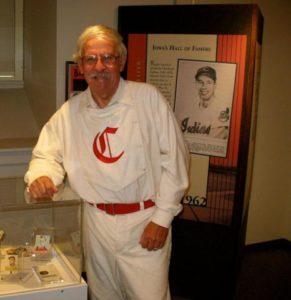
John is Professor Emeritus of History and Political Science at Des Moines Area Community College (DMACC.) He taught courses in Political Science, U.S., and Iowa History from 1972-2010. He has a B.S in History and
an M.A. in Political Science from Iowa State University. He received an “Excellence in Education” award in 2001 and was honored as DMACC’s “Educator of the Year” in 2004. He served five terms on the State Historical
Society of Iowa’s Board of Trustees from 1998 – 2113, having served both as Chair and Vice-Chair; and, on the Iowa Historical Foundation, the fundraising arm of the State Historical Society of Iowa. Since retiring, he
has taught courses for the Senior College of Greater Des Moines on “Iowa’s Role in the Civil War,” Iowa’s Ethnic Heritage,” and the “Early History of Baseball in Iowa.” John has been a 22-year member and Program Chair
of the Des Moines Civil War Roundtable.
A life-long baseball card collector, John owns an extensive collection of cards and memorabilia representing Iowa’s 222 Major Leaguers, featuring Iowa’s seven Hall-of-Famers. A charter member of Iowa’s “Field of Dreams”
chapter of the Society for American Baseball Research (SABR), he has published numerous articles on Iowa baseball history and currently serves on an ‘ad hoc’ committee working with Major League Baseball to host activities
at the Field of Dreams site as part of the game to be played on August 12, 2021. Over the past 11 years, he has done over 160 presentations on baseball history throughout Iowa, often appearing as Montrose, Iowa’s Calvin McVey,
Iowa’s first professional baseball player, who played for America’s first all-professional baseball team-the 1869 Cincinnati Red Stockings. John lives in West Des Moines, Iowa with his wife, Dianne.
How Iowa Met Baseball: the Myths, the History, the Players
Over the past century the setting for the spring passion of many Iowans has been the ballpark. This presentation explores the myths of baseball’s origins, the early history and evolution of the game, baseball’s journey to
Iowa and the role of the Civil War in spreading its popularity. Audiences will learn about some of Iowa’s baseball pioneers and view an extensive collection of baseball memorabilia featuring Iowa players.
Iowa’s Role in the Civil War
This presentation tells the story of how Iowa events and changing attitudes from 1830-1861 influenced its Civil War roles; the evolution and changing status of laws affecting black Iowans; the role played by Iowans during
the war, including key individuals and battles; the home front; and finally, the immediate and long-term impact on Iowa history.
Iowa’s Ethnic Heritage: A Brief History
Enjoy the unfolding adventure of Iowa’s immigration history. From Native Americans to Spanish explorers and French trappers and traders; to German, Irish and English groups; to more recent arrivals including Sudanese,
Bosians and Burmese — Iowa has had a long, rich ethnic heritage. Follow chronologically as our immigrant ancestors chose to leave their home, settled in Iowa, and added their ethnic contributions to our unique state history.
Jennifer Sterling
The University of Iowa
Phone: 319-384-3490
Email:
jennifer-sterling@uiowa.edu
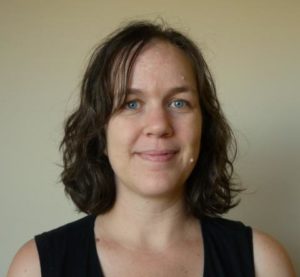
Jennifer Sterling is a Lecturer in the Sport Studies program in the Department of American Studies at the University of Iowa. A small-town Iowa native (Fremont), she completed her undergraduate degree at Central College (Pella) and returned to her home state after completing a postdoctoral fellowship at Georgia Institute of Technology, and degrees at the University of Maryland (PhD) and Seattle Pacific University (MA). She teaches courses on sport in Iowa, inequality in American sport, sport technology, sport history and the Olympics.
6-on-6 Girl’s Basketball in Iowa: Traditions, Transitions, and Legacies
For most of the 20th cenury, Iowa was known for its devotion to a unique form of women’s sport known as 6-on-6 girls’ basketball. As other states abandoned 6-on-6 in the 1970s, Iowa remained committed to this half-court game until 1993, when the final 6-player championship was held. This multi-media presentation recounts Iowa’s 6-on-6 history, connects it to the development of girls’ and women’s sport in the United States, and welcomes audience members to share their own stories and collections.
Tina Bakehouse
Hastings
Phone (712) 789-0158
tina@mapleedgefarm.com

Protecting audiences from boring speakers and speeches, Tina Bakehouse has started her own company, Tina B LLC, to provide holistic communication consulting and coaching to help heart-centered leaders and organizations internationally and nationally to communicate more effectively. With more than 20 years of teaching communication and theatre (10 years as an instructor at Creighton University), a former Walt Disney Cast Member, Leadership Iowa participant, and TEDx speaker and coach, Tina is passionate about educating others to become more self-aware and enhance their authentic speaker style through transformational workshops in improvisation, storytelling, temperament, and communication.
Helen Lewis
Sioux City
Phone: (712) 274-8733, ext. 1423
Email:
helen2000hum@yahoo.com

Helen Lewis, an Eastern transplant to the Midwest, teaches at Western Iowa Tech Community College in Sioux City. She has taught English and Humanities courses since 1971, and her special interests include Westerns, women artists, Medieval mysteries and square dancing. Ms. Lewis portrays Jane Addams for the Great Plains Chautauqua Society, Inc.
Voicing a Cause, Voicing a Self: Jane Addams at the Hull House
Throughout her long career advocating the needs of impoverished immigrants, exploited laborers, youth criminals and war victims, Jane Addams valued Hull House, her settlement house in Chicago, as the center from which she
and her colleagues could assist others, improve society and benefit themselves. She trusted social democracy to restore dignity to the marginal. Her many publications reveal a person finding identity and purpose through her
causes. The presentation, done in costume of the period, helps the audience to understand the path chosen by this Nobel Peace Prize recipient.
Women of Warmth, Wisdom and War: Images of Native American Women in Westerns
Although film critics and viewers frequently dismiss Native American women in Westerns as stereotypes providing background for the action, a reexamination of Westerns reveals that Native American women characters often have
more than a mere setting or sexual purpose. Despite the lack of Native American actresses in the films, the Westerns have depicted the Native American cultures with women as healers, counselors and even warriors. This presentation
considers those Westerns readily available on video in order to offer the audience a new way to view old Westerns. (Includes film clips.)
Michael Vogt
Des Moines
phone: 515-252-4531
email:
mmm_iowa@hotmail.com

Michael Vogt, a native of Gladbrook, Iowa, is presently a curator for the Iowa Gold Star Military Museum at Camp Dodge, in Johnston, Iowa. He earned a Bachelor’s Degree in history with a secondary teaching endorsement in 1991 and a Master’s Degree in United States history in 1997 from the University of Northern Iowa. He served on the Board of Directors as a volunteer and board chair for the Iowa Museum Association and the State Historical Society of Iowa Board of Trustees. Past work experience includes employment as museum director for the Historical Society of Marshall County, Iowa, site supervisor at Living History Farms in Urbandale, Iowa, and assistant instructor at the Center for American Archaeology in Kampsville, Illinois. In addition, he has taught as an adjunct history instructor for Grand View University, Simpson College, and Buena Vista University. Mike has published articles on American and military history in magazines, newspapers, journals, and books including Iowa Heritage Illustrated, The Iowan, the Des Moines Register, Iowa History Journal, and The Biographical Dictionary of Iowa. Upon completion of FAA ground school and flight training he received a pilot license in 2009.
Camp Dodge: Home Away from Home 1917-1918
Following the U.S. entry into World War I the War Department undertook the task of raising, training, equipping and arming a force large enough to successfully contribute the Allied war effort. Camp Dodge, Iowa, was selected as one of 16 training camps for draftee soldiers. The small Iowa National Guard camp was expanded into the largest military base in Iowa’s history. the upper Midwest.
With a PowerPoint slide show presentation, viewers will learn how, from September 1917 through November 1918, 37,111 Iowa draftees left cities, towns and farms to become soldiers during the First World War. Period images, maps, letters, and data will detail how many of many of these Iowans left home for the first time. For these Iowans and other inductees from the upper Midwest, Camp Dodge became their new “Home Away from Home.”
Company M, 7th U.S. Infantry Immunes during the Spanish-American War
Described by Secretary of State John Hay as a “Splendid Little War” the war with Spain became of the most popular conflicts in U.S. history. Among the troops raised for service was Company M, 7th Immunes from Des Moines. Thought to be immune from tropical diseases due to their African-American heritage, enthusiastic black volunteers joined the U.S. Army for service in Cuba. A PowerPoint slide show presentation will acquaint participants with examples of local and national racism faced by black soldiers serving in a segregated army and how these Iowans persevered and performed their duty honorably and with great credit upon their home state.
Danuta Hutchins
Storm Lake
Phone: (712) 732-6779
Email:
hutchinsd@bvu.edu

Danuta Zamojska Hutchins, of Storm Lake, was born in Warsaw, Poland and experienced the ravages of Nazi occupation, their reprisals for the Warsaw Uprising of 1944 and Poland’s fall to communism after its liberation by the
Soviet Army. Dr. Hutchins left Poland in 1962 to study American literature and language at the University of Minnesota. She received her Ph.D. in Modern Languages, Education and Linguistics from the University of Minnesota,
Minneapolis. Dr. Hutchins has taught Slavic Languages, Literatures and Cultures at Buena Vista College (now University) at Storm Lake, Iowa; Indiana University at Bloomington, Indiana; Iowa State University at Ames, Iowa
and Ohio State University at Columbus, Ohio. She has also taught courses in German Language, Literature and History and Russian Language and Literature at Teikyo-Westmar University and Westmar University at Le Mars, Iowa
from which she retired at its closure in 1995. She has authored many papers and book chapters in her field and has written four books of general interest. Her early retirement enabled her to devote her time to her artwork,
resulting in several successful group and solo exhibits of paintings, etchings and sculpture.
Dr. Hutchins and her husband, a professor of Chemistry at Buena Vista University in Storm Lake, have two grown children, Edward and Maria.
Ukraine 101
I earned a U.S. university PhD in Slavic Languages, Literature and Linguistics. In view of the barbaric, unprovoked, Russian army’s military invasion of Ukraine, I feel compelled to correct the misinformation Putin has spread about the relationship between Russia and Ukraine through which he justified his genocidal deeds. To that purpose I have reached for my notes, scholarly papers and publicly available historical sources to compile the essential facts and events that we should know as a background when addressing the current horrifying events of Putin’s war.
In Ukraine 101 I am presenting the history and current events in Ukraine, from the early Rurikids, the Kyivian Rus’, the Polish/Lithuanian empire, the tsarist Russia takeover, the Soviet suppression of Ukrainian language and culture through the 1991 regaining of freedom from the collapsed Soviet empire, and the current genocidal war waged by Putin. Arranged chronologically are the main dates and names of significant figures and events. This compilation represents the essence of necessary knowledge to be able to consider and report on Ukraine’s current valiant battle to repel the invaders who are trying to annex and annihilate the land, the culture and its people.
The Butterfly Effect: Why Do We Feel Empathy with the Victims of War, Hunger, Terror and Natural Disasters?
Referring to her book, “Torn Out Memories,” Dr. Hutchins tells the experiences of a child living under the Nazi occupation of Poland and during the Warsaw Uprising. She relates her personal trauma to the terrors suffered
by the victims of 9/11 attacks.
Herbert Hoover’s Role in Distributing Food in Post WWI and WWII in Europe
As a child, Dr. Hutchins experienced firsthand President Hoover’s distribution of food in Poland after WWII. A chapter in her book, “Torn Out Memories,” gives details of those experiences and her connection with the Hoover
birthplace in West Branch.
Sacred and Profane Art Presented in Power Point
are the issues and images of the human body in European art of the Middle Ages through the present. Images selected include examples of figurative paintings, drawings and caricature, as well as sculpture. Discussion centers
on both the aesthetic and the philosophic considerations of the human image as a vehicle of veneration and beauty versus that of scorn and distortion.
Flowers of the Prairie
With a copy of the “Prairie and Woodland Flowers Coloring Book” as reference, this presentation identifies prairie wildflowers, their common English names and Linnaeus-based classification in Latin. It informs when they blossom,
where they grow and what medicinal and food uses have they served during the times of early pioneers and Native American Peoples. With the “hands-on” component of drawing/coloring images of those flowers, this presentation
can be taken to the local prairies or prairie gardens and tailored to specific ages and interests upon request.
Understanding and Reading Slavic Poetry in English Translation
This presentation includes recitation and discussion of poems and short poetic works written by the most outstanding contemporary Slavic authors, centered especially on women poets. Discovering some intimate details in their
biographies and significant events surrounding them and their epoch enhance the understanding of selected works and bring these poets to life. Some humorous commentaries on the idiomatic and cultural differences between the
works’ original language and that of the English translation provide a glimpse into the task of literary transposition from a very personal vantage point by Danuta Hutchins, herself a poet and published translator of many
poetic works into and from the English language.
Chad Timm
Indianola
Phone: 515-961-1245
Email:
chad.timm@simpson.edu
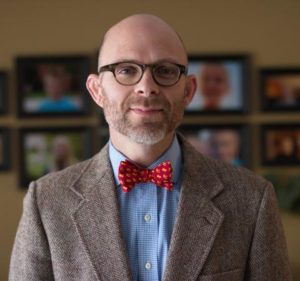
Chad W. Timm is an Associate Professor of Education at Simpson College in Indianola, Iowa. He taught high school history for 15 years and has also been teaching future social studies teachers since 2010. His Master’s Degree
in Agricultural History and Rural Studies and his PhD in Education are both from Iowa State University.
Timm is an Iowa native who grew up hearing stories from his grandmother, Alice A. McNamara, about her work at Earl May Nursery in Shenandoah, Iowa, during the Second World War. Alice told him about the Japanese men who worked
at Earl May in 1945, which sparked an interest in finding out how that could have been possible. Eventually he discovered that Japanese soldiers had been housed at a nearby Prisoner of War camp in Clarinda, Iowa, where the
soldiers were hired out to alleviate local labor shortages. He was voted teacher of the year in 2001 and 2008 by the high school students he taught, was a state finalist for the 2006 Daughters of the American Revolution Outstanding
History Teacher Award, and his dissertation received 2nd place in 2009 for both the American Educational Research Association Outstanding Dissertation Award and the Illinois Distinguished Qualitative Dissertation Award.
Working with the Enemy: German, Italian and Japanese Prisoners of War in Iowa during the Second World War
As part of a relatively quiet and under-publicized government program, thousands of enemy soldiers invaded Iowa in 1943. With the hugely successful 1942 Allied campaign against Adolf Hitler’s vaunted Afrika Corps in North
Africa, the number of enemy prisoners of war (POW) needing interment grew dramatically. Great Britain, no longer able to accommodate the increasing number of POWs, looked to the United States for help. Helping with the detainment
of enemy POWs made sense, as American cargo vessels were returning home after delivering war materials with empty hulls.
What began as an experiment in isolated locations in the south and southwest eventually led to more than 500 camps and 400,000 enemy soldiers interned in the United States, including two camps in the state of Iowa. Due to
a severe shortage of agricultural laborers coupled with increased War Food Administration quotas for farm goods, Iowa’s farmers needed help doing their part to assist the United States in winning the war.
This talk will focus on the creation of two POW camps in Iowa during the Second World War: one in the Northern Iowa town of Algona and one in the Southwestern Iowa town of Clarinda. Some of the topics discussed will be life
in a prisoner of war camp, community relations, the POW labor program, branch camps in more than 30 Iowa communities and the arrival of Japanese prisoners at Camp Clarinda in early 1945. Camp Clarinda was one of only two
camps in the country to house Japanese soldiers. The story of POW interment in Iowa is a fascinating story of Iowans being confronted by the enemy: an enemy they not only needed to help them meet their wartime goals, but
also challenged them to find their humanity.
Brooks Landon
Iowa City
Phone: (319) 335-0454
Email:
brooks-landon@uiowa.edu

Brooks Landon is a Professor in the University of Iowa English Department, where he teaches courses on contemporary literature, including science fiction, and a Prose Style course devoted entirely to the many forms sentences can take. He is currently fascinated by the apocalyptic turn in contemporary postmodern fiction, and has become something of an expert in forms taken by our current fascination with zombies, devoting a course, “Dead is the New Alive” to the question: Why do we apparently need all these zombie stories? His postmodern fiction course, “Masters of Disaster,” focuses on the many kinds of non-zombie apocalypses that have recently appeared in literary fiction. His Prose Style course is built around his book, Building Great Sentences: How to Write the Kinds Sentences We Love to Read. Landon earned his PhD from the University of Texas at Austin and has been at Iowa since 1978.
A User’s Guide to Postmodern Fiction
Postmodernism means many different things in many different contexts. Postmodern architecture is not the same as postmodern fiction and postmodern fiction comes in more flavors than a well-known ice cream purveyor has flavors.
Postmodern fiction comes after modern fiction, but modern fiction still gets written. Postmodern fiction is a reaction against modern fiction, but still shares many of its concerns and characteristics. Postmodern fiction
is a mess. And, whatever it was, it’s almost certainly over, possibly replaced by a sensibility that is post 9/11.
For purposes of this talk—but without relying too heavily on critical jargon, I’ll consider postmodernism largely in terms of Lyotard’s description of it as a resistance to meta-narrative (“big” narratives that claim to explain
everything, such as religion or Marxism) and of Jameson’s description of it as a “cultural dominant” (an attitude or atmosphere that pervades everything). More specifically, I define postmodernism as the culture of the easy-edit,
a time when science and technology allow us to change just about anything. And I define postmodern fiction as fiction that rises from or responds to postmodern culture.
It’s probably more accurate to speak of postmodernisms than of a single postmodernism and it’s almost certainly more accurate to speak of postmodern fictions than of a single postmodern fiction. So, I’ll be talking about
a fair number of novels that approach postmodern concerns from a fair number of different angles—books by familiar authors such as David Foster Wallace, Thomas Pynchon and Don DeLillo, as well as books by younger and lesser
known authors such as William Gibson, Jonathan Lethem, Chuck Palahniuk, Mark Leyner and Max Brooks. My goal will be to create a broad context in which readers can more specifically place some of their own favorite authors
and have a better idea of what they are up to.
Building Better Sentences: A Quick and Dirty and Pretty Much Grammar-Free Guide to More Effective Writing
Best-selling and critically acclaimed American novelist Don DeLillo has written: “This is what I mean when I call myself a writer. I construct sentences.” And Pulitzer Prize winner Michael Cunningham has written: “I’m still
hoping to write a great sentence. If I do, I’ll let you know.” I will show how attention to a very few ideas can help anyone write better sentences. This is a talk about all the important ways sentences get longer—and shorter.
We will learn about how they work, what they do and how we can think and talk about them in ways that will help both our own writing and our reading. Our concern will be with stretching our sense of options—all the things
a sentence can be and/or do—not a trudge toward grammatical correctness and avoidance of errors, but a dance with language, a celebration of the gift of style.
Debra Marquart
Iowa Poet Laureate
Iowa State University
515-290-7731
marquart@iastate.edu

Debra Marquart is a Distinguished Professor of Liberal Arts and Sciences at Iowa State University and Iowa’s Poet Laureate. Her work explores the relationship between the spoken word, the literary arts, storytelling, and music. Marquart has published six books, including Small Buried Things: Poems, and The Horizontal World: Growing up Wild in the Middle of Nowhere, and she continues to perform with her jazz-poetry, rhythm & blues project, The Bone People, with whom she has released two CDs: Orange Parade (folk/rock) and A Regular Dervish (jazz-poetry). Her work has received over 50 grants and awards including a National Endowment for the Arts Fellowship, a PEN USA Nonfiction Award, a New York Times Editors’ Choice commendation, and Elle Magazine’s Elle Lettres Award, and has been featured on the BBC and National Public Radio. She is the senior editor of Flyway: Journal of Writing & Environment, and she teaches creative writing in ISU’s MFA Program in Creative Writing and Environment and in the Stonecoast Low-Residency MFA Program at the University of Southern Maine.
POETRY, MUSIC & THE ENVIRONMENT
Debra Marquart is available to read from her creative work (poetry, fiction, memoir) and to perform music alone, or with her band, The Bone People. A singer-songwriter, Marquart fuses poetry, music, and storytelling in her performances. The topics in Marquart’s five books and ongoing research projects range widely to include the following: agriculture and rural life; music performance and popular music history; immigration and travel; and environmental issues such as oil extraction and climate change.
Jody Swilky
Des Moines
Phone: (515)-710-3667
Email:
Jody.swilky@drake.edu

During his thirty years at Drake University, Jody Swilky was the Ellis and Nelle Levitt Distinguished Professor of English, and he served as Director of Cultural Studies. He wrote and co-produced the award-winning documentary A Little Salsa on the Prairie: The Changing Character of Perry, Iowa, which has had over 50 screenings in the U.S and Mexico, been featured at film festivals, and shown on Iowa Public TV and The Documentary Channel. He also served as head researcher/consultant for the The Fort: 177 Years of Crime and Punishment at Iowa State Penitentiary. Lecturing widely, he has focused his presentations on immigration to Iowa, and his writing and film work have received grants from the National Endowment for the Humanities, Humanities Iowa, Iowa Arts Council, and The Bock Family Foundation.
Lectures and workshops
Jody Swilky is available to lead script-writing workshops for television and film, focusing on documentary and dramatic productions. He welcomes invitations to lecture on the relationship between immigration, industry and ethnicity in Iowa, with or without public screenings of his documentary on the subject.

